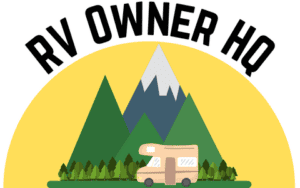

36 Essential RV Travel Tips Every RVer Needs to Know
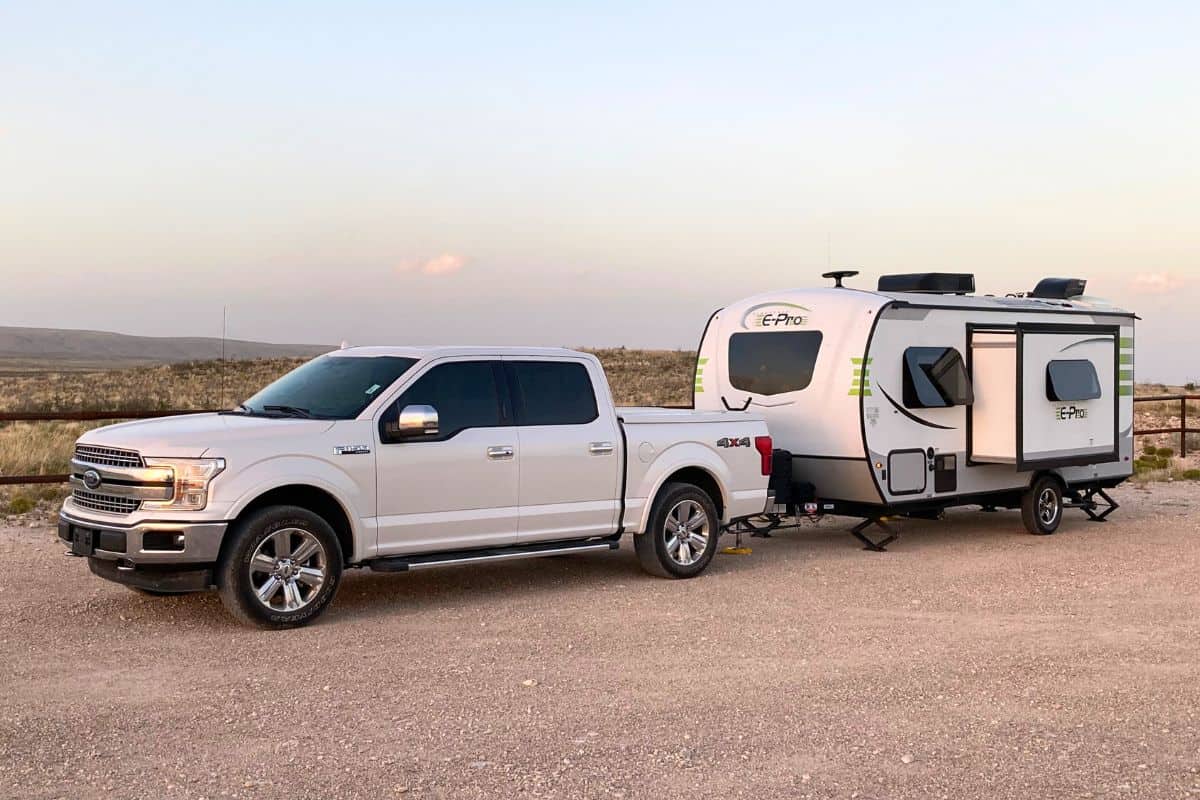
Are you ready to hit the open road in your RV?
Before you set off on your adventures, it’s crucial to have the right RV travel tips and RV accessories up your sleeve.
As a seasoned RVer, I’ve learned that preparation is key to ensuring a smooth and enjoyable trip.
In this comprehensive RV travel guide, we’ll dive into 36 must-know RV travel tips and hacks , covering everything from pre-trip planning to campground etiquette to making the most of your adventures with kids in tow.
Whether you’re an RV beginner or a seasoned veteran, these travel tips will help you make the most of your time on the road.
Pre-Trip RV Travel Tips
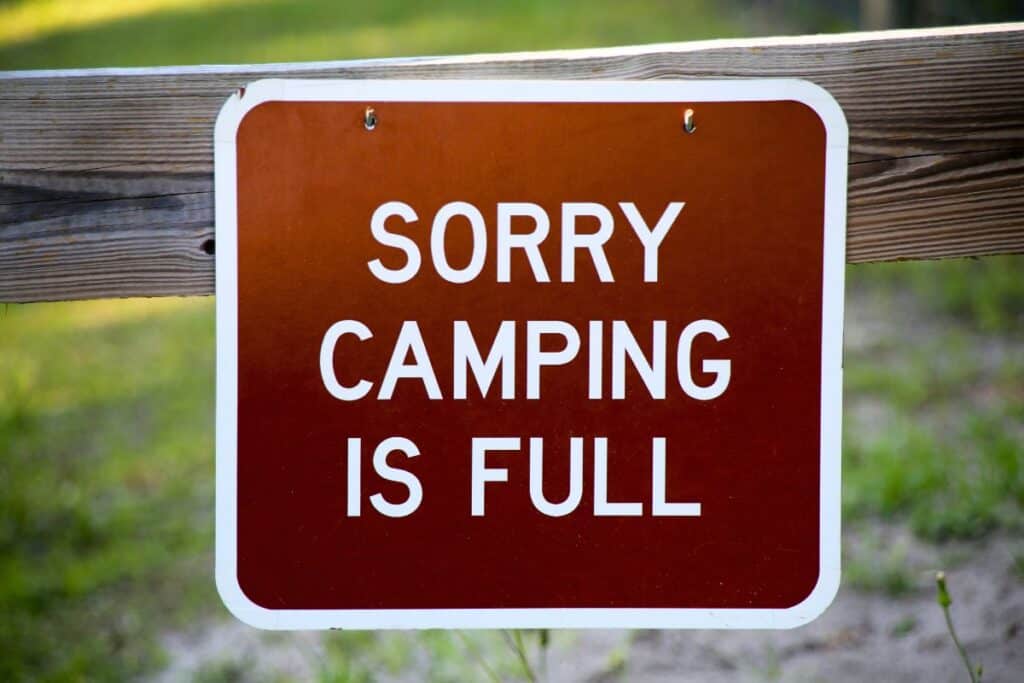
Before hitting the road, taking time to plan ahead is essential for a smooth and enjoyable journey.
From researching your destination to creating a comprehensive checklist and mapping out your route, these pre-trip RV travel tips will help you stay organized and prepared for anything that comes your way.
1. Research Your Destination: Scout it Out Before You Go
Before setting out on any RV adventure, it’s important to spend some time researching and planning your trip.
Things to research and check include campground amenities, reviews, and availability to ensure that your chosen location meets your needs.
Consider the weather and seasons when planning your trip, as some destinations may be more enjoyable during specific times of the year. (Also don’t just assume that everything is open year-round, as many destinations including up north or in the mountains close down for the winter season, which can extend into late fall and early spring.)
Also, don’t forget to look for nearby attractions and activities that align with your interests, such as hiking trails, fishing spots, or cultural landmarks.
2. Create & Use a Checklist: Tick-Tock, It’s Checklist O’Clock
Creating and using a comprehensive checklist is a must if you don’t forget anything.
List all the necessary food, medications, clothing, bedding, kitchenware, and toiletries you’ll need for your trip.
Remember to include RV-specific items like hoses , leveling blocks , and a tire pressure gauge.
Some RVers like to have different lists for each packing category, personally though, I find it easier to just have one master list to work from, so I have everything I need for the trip in one place.
Also, don’t forget to check that you have all your important travel documents, such as your ID, vehicle registration, insurance papers, and passport, if you plan on crossing a border before departing.
3. Plan Your Route: Map Your Adventure
Another important RV travel tip is to plan your route ahead of time, as this will help ensure a stress-free RV journey.
Utilize RV-specific GPS like this popular one on Amazon or route-planning apps to find the most suitable roads for your vehicle.
Take into account road conditions, tolls, and low clearances that may affect your travel.
Factor in fuel stops and rest areas along the way to ensure a comfortable and safe trip.
4. Make Reservations in Advance: Don’t Get Left Out in the Cold
RV travel and camping are more popular than ever, which makes reserving you’re campsite as early as possible more important than ever.
Popular campgrounds fill up quickly, as it’s not uncommon for national and even state parks to fill up months in advance, especially around major holidays, think Fourth of July, Labor Day, and Memorial Day.
So make sure to book your camping spots as early as possible to not only secure a site but also to snag one of the better campsites, personally, I always look for waterfront options.
Before making that reservation though, make sure you’re aware of the campground’s cancellation policies in case your plans change unexpectedly.
5. Check Weather Forecasts: Weather or Not
Before embarking on your RV trip, check the weather forecasts for your planned route and destination.
Being aware of potential adverse conditions like storms, extreme heat, or cold will help you prepare accordingly.
Pack appropriate clothing, gear, and emergency supplies based on the expected weather.
If severe weather is predicted, consider adjusting your travel plans to ensure the comfort and safety of you and your passengers.
RV Travel Tips (Maintenance & Safety)
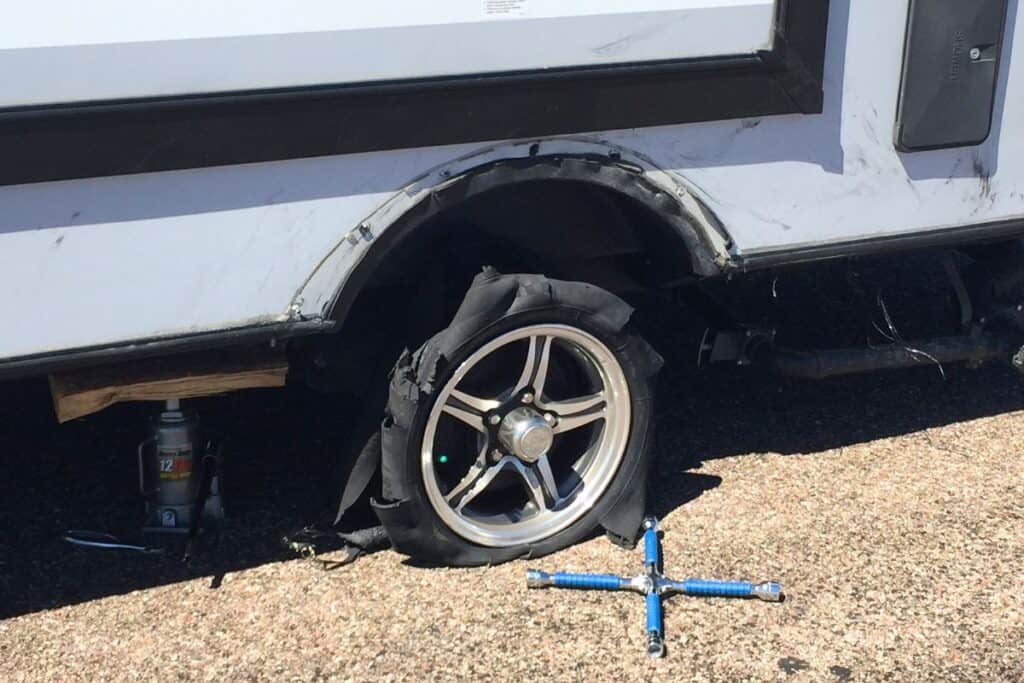
Making sure your RV is in tip-top shape and prioritizing safety are crucial aspects of any successful RV road trip.
In this section, we’ll cover essential maintenance and safety RV travel tips that every RVer should know.
6. Perform Regular Maintenance Checks: Fix It Before It Fails
Performing regular maintenance checks is a must to keep your RV in good working condition and prevent unexpected breakdowns.
Before each trip, take the time to check your fluids and batteries to ensure they are at the proper levels.
Inspect belts, hoses, and filters regularly for signs of wear or damage, and replace them as needed.
It’s also important to perform regular inspections of the RV roof and slide-outs, paying close attention to seals and caulk to ensure the camper is watertight, as it’s always easier to fix a compromised seal or caulk with home court advantage.
I’ve found keeping all these RV maintenance tasks and inspections in my head challenging, because of this, I keep an RV maintenance log and schedule to help me stay on top of it all.
7. Check Tire Pressure & Tread: Tread Wisely
Maintaining proper tire pressure and tread depth is critical for the safety and performance of your RV.
Regularly check your tire pressure using a reliable tire gauge like this popular one on Amazon that doesn’t require batteries , and inflate tires to the manufacturer’s recommended level.
Inspect your tires for signs of uneven wear, damage, or objects lodged in the tread.
Replace tires when the tread depth reaches the minimum safe level, the U.S. Department of Transportation recommends replacing tires when they reach 2/32″ . A common way to check this is to place a penny facing down inside the tire’s tread, if you can see the top of Lincon’s head, it’s probably time to replace your tires.
8. Know Your RV’s Dimensions & Weights: Size It Up
Knowing your RV’s dimensions and weights is critical for safe and legal travel.
RV Lengths & Weights You Should Know:
- Overall RV Length (With and Without the Tow Vehicle)
- Fully Loaded Weight
- Cargo Carrying Capacity
- Gross Vehicle Weight Rating
It’s important to be aware of height, length, and width restrictions on the routes you plan to take, as some roads, bridges, and tunnels may have limitations that could impact your RV.
It’s also important to ensure that your RV is not overloaded, as this can cause safety issues and put undue stress on your vehicle’s components.
Make sure to distribute weight evenly throughout your RV for better handling and stability on the road.
9. Practice Safe Driving: Drive Smart
Driving or towing an RV, while manageable for most drivers with a little practice, requires a different skillset, careful attention to detail, and extra caution, due to the longer length and extra weight.
So before heading out, it’s important to familiarize yourself with your RV’s size, weight, and handling characteristics.
Take the time to practice driving or towing your RV in a safe, open area to gain confidence and develop a feel for its unique dynamics.
Adjust your driving speed to accommodate your RV’s size and the road conditions, as larger vehicles require more time to accelerate, brake, and turn.
Allow extra space for turning and stopping, and be mindful of your RV’s tail swing when maneuvering in tight spaces.
Use extra caution in high winds and mountainous terrain, as these conditions can affect your RV’s stability and handling substantially.
It’s also really important to maintain a safe following distance and be mindful of your RV’s height when navigating underpasses or low-hanging branches.
10. Install & Properly Maintain Safety Devices: Staying Safe on the Road
Installing and maintaining safety devices in your RV can provide peace of mind and protect you and your family.
Equip your RV with smoke detectors, carbon monoxide detectors, and fire extinguishers, and check them regularly to ensure they’re in good working order.
Also make sure the camper has proper ventilation to prevent gas leaks and buildup, which can be dangerous in confined spaces.
Plus, it’s also a good idea to add a backup camera and tire pressure monitoring system for added safety and convenience, if you’re RV didn’t come with those features standard, which most don’t.
- See the best affordable RV backup camera system I’ve found, which is the AMTIFO Wireless Backup Camera.
- See the best affordable tire monitoring system I’ve found, which is the Tymate RV Tire Pressure Monitoring System
11. Have an RV Tool Kit: Ready, Set, Repair
Having a well-stocked RV tool kit on hand can be a lifesaver in case of unexpected repairs or maintenance needs.
Include essentials like a jack, lug wrench, pliers, screwdrivers, wrenches, and a multimeter.
Don’t forget to pack spare fuses, light bulbs, and batteries, as well as duct tape, zip ties, and a can of WD-40 for quick fixes.
Having these tools readily available can help you tackle minor issues and avoid costly roadside assistance calls.
If you’re starting from scratch, this basic tool kit from DEKOPRO on Amazon is a great place to start.
12. RV Appliance Check: Keep It Cooking
Before setting out on your trip, conduct a thorough check of all your RV’s appliances to ensure they are functioning properly.
Test your refrigerator, stove, oven, microwave, and air conditioning unit, and address any issues or malfunctions before hitting the road.
Also, make sure your water heater, pump, and tanks are in good working order, and familiarize yourself with the operation of your RV’s generator, if your camper has one.
13. Have Emergency Plans: Better Safe than Sorry
Having emergency plans in place before an emergency can help you navigate unexpected situations with confidence and minimize potential risks or danger.
Create a communication plan that includes emergency contact information for family members, friends, and roadside assistance services.
Develop an evacuation plan that outlines escape routes and designated meeting points in case of fire, severe weather, or other emergencies.
Familiarize yourself with basic first aid procedures and pack a well-stocked first aid kit tailored to your family’s needs.
14. Invest in an Emergency Beacon: Safety Signal
Investing in an emergency beacon can provide an added layer of safety and peace of mind, especially when traveling in remote areas or off-grid locations with no cell service.
Emergency beacons, such as personal locator beacons (PLBs) or satellite messengers, allow you to send distress signals and communicate your location to emergency responders in case of an emergency situation.
If you do choose to invest in an emergency beacon be aware that most require a monthly subscription plan for service.
It’s also important to make sure to familiarize yourself with the device’s operation and regularly test and maintain it to ensure it’s ready when you need it most.
Campground Etiquette & Setup RV Travel Tips
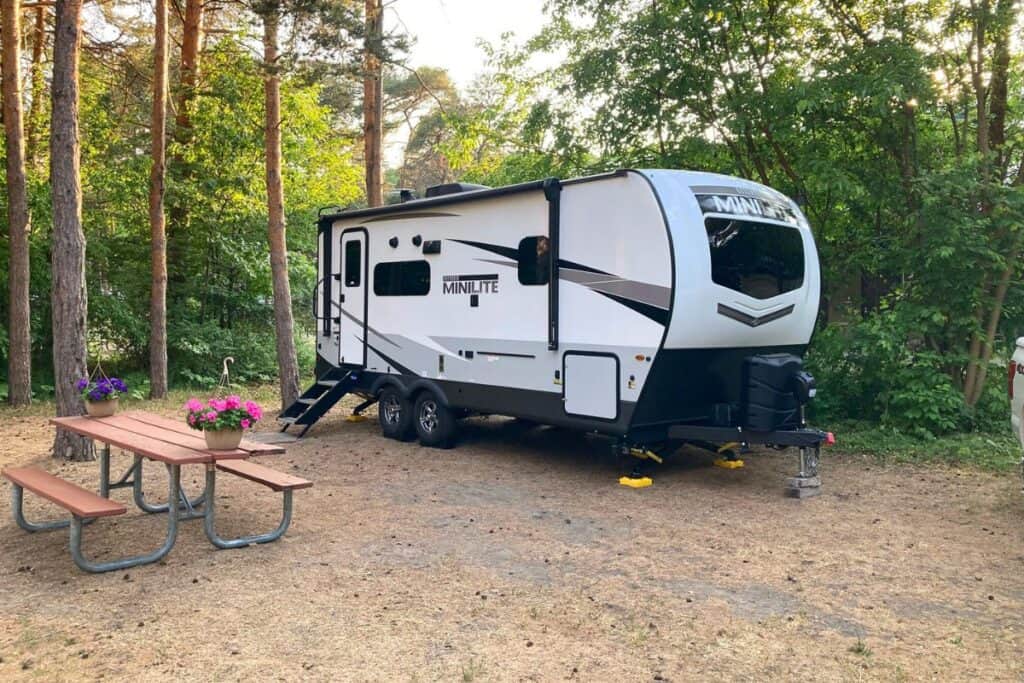
When arriving at a campground, be mindful of your surroundings and fellow campers.
Practicing good campground etiquette and following proper setup procedures can help ensure a pleasant experience for you and everyone around you.
15. Follow Campground Rules: Don’t Be a Rule Breaker
When staying at a campground, make sure to familiarize yourself with and follow the established rules to ensure a harmonious experience for everyone.
Respect quiet hours and noise levels, which are typically posted at the campground entrance or office.
Keep in mind that sound can travel easily in outdoor settings, so be mindful of your volume, especially during early morning or late evening hours.
If you’re traveling with pets, adhere to the campground’s pet policies, which may include leash requirements, designated pet areas, and waste disposal guidelines.
Lastly, avoid cutting through other campsites as a shortcut, as this can be seen as disrespectful and an invasion of privacy.
16. Practice Good Neighbor Habits: Campground Manners
Practicing good neighbor habits goes a long way in creating a positive campground atmosphere.
Keep your campsite tidy and clean by properly disposing of trash, storing food and supplies, and keeping your area free of clutter.
Be friendly and respectful to fellow campers.
If you notice a neighbor in need of assistance, such as helping with setting up equipment or providing a tool they may have forgotten, it’s always nice to offer your help.
However, it’s also important to always respect others’ privacy and personal space, as some campers may prefer a more solitary experience.
Being a good camp neighbor basically boils down to the golden rule, which is “Do to others what you would have them do to you”.
17. Master RV Parking & Leveling: Park Like a Pro
Mastering the art of RV parking and leveling isn’t as hard as you think if you’re an RV beginner.
Before arriving at your campsite, learn how to back your RV into a site safely.
Practice in an open area, using your mirrors and a spotter if necessary, until you feel confident in your ability to maneuver your RV in tight spaces.
Once parked, use leveling blocks and or jacks to ensure your RV is stable and level.
A level RV not only provides a more comfortable living space but also helps your refrigerator and other appliances function properly.
Don’t forget to chock your wheels to prevent your RV from rolling, particularly if you’re parked on an incline.
18. Set Up Utilities Properly: Utility Check
Setting up your RV’s utilities properly is important for both your comfort and the safety of your equipment.
When connecting to electrical, water, and sewer hookups, follow the proper procedures outlined in your RV’s manual or the campground’s guidelines.
For electrical connections, use an RV surge protector appropriate for your camper’s amperage to safeguard from power fluctuations.
When connecting your water hose, ensure it is clean and free of leaks to prevent water waste and potential damage to your RV or the campground’s facilities.
It’s also not a bad idea to use an inline RV water filter and a pressure regulator .
If your RV has a sewer connection, use a high-quality sewer hose like this one from Camco and secure it properly to prevent leaks or spills.
Maintain clean and leak-free hoses by storing them in a designated compartment and replacing them when necessary.
19. Campfires & Firewood: Campfire Fundamentals
Gathering around a campfire is a quintessential part of the camping experience, but it’s important to follow proper campfire etiquette and safety guidelines.
Before starting a fire, check the campground’s rules and local fire regulations to ensure that campfires are permitted.
Always use designated fire pits or rings.
When collecting firewood, follow the campground’s guidelines, as some may require you to purchase firewood on-site to prevent the spread of invasive species.
If allowed to gather your own wood, collect only fallen, dead branches, and never cut live trees or branches.
Keep your fire small and manageable, and always have a bucket of water or sand nearby to extinguish the flames if necessary.
Before retiring for the night or leaving your campsite, ensure that your fire is completely extinguished, dousing it with water and stirring the ashes until they are cool to the touch.
RV Living & Organizational RV Travel Tips
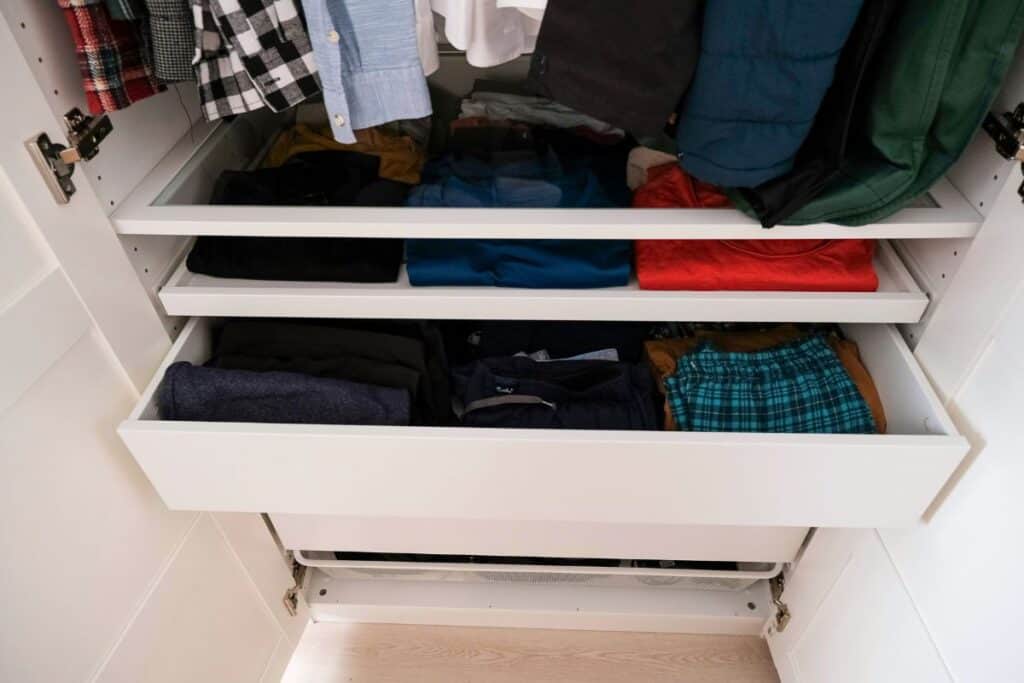
Living in an RV can be a fun and adventurous experience, but it also comes with its own set of challenges, particularly when it comes to space limitations and organization.
To make the most of your RV living, it’s important to develop practical strategies for maximizing storage space, simplifying daily tasks, and maintaining a clutter-free environment.
In this section, we’ll explore a range of RV travel tips for RV living and organizations designed to help you create a functional and comfortable home on wheels.
20. Maximize Storage Space: Unlock Hidden Storage
Maximizing storage space is crucial when traveling in an RV, as every square inch counts.
To make the most of your limited space, utilize vertical storage solutions like shelves and organizers.
Install hooks, pegboards, or magnetic strips to keep items like cooking utensils, tools, and toiletries easily accessible and off countertops.
Add multi-functional furniture with built-in storage, like storage ottomans for added storage.
It’s also helpful to store smaller items in labeled bins or containers, as this helps to keep you organized.
For even more RV storage ideas, check out our blog post “ 47 RV Storage Ideas to Maximize Your Space for Compact Living “.
21. Simplify Meals & Cooking: Easy Eats
Simplifying your meals and cooking routine can make RV living more enjoyable and less stressful.
Plan your meals ahead of time and prep ingredients before your trip to save time and reduce food waste.
Use versatile appliances like slow cookers and instant pots, which allow you to create delicious, one-pot meals with minimal effort and cleanup.
These appliances are also great for conserving energy and minimizing heat generation inside your RV.
Stock your pantry with non-perishable staples and emergency food, such as canned goods, dried pasta, and trail mix.
This ensures that you always have a meal on hand, even if you’re unable to visit a grocery store or don’t feel like making a big meal.
22. Conservation & Managing Waste: Waste Not, Want Not
Managing waste and practicing conservation is always important but it’s even more important when traveling in an RV.
When it comes to your RV’s waste tanks, use biodegradable, RV-safe treatment drops or chemicals to break down waste and prevent odors.
Regularly monitor your tank levels and dispose of waste at designated dump stations, following proper procedures to avoid spills or contamination.
Implement water-saving techniques when washing dishes or showering, such as using a basin to collect water while washing and taking shorter showers.
You might even want to try a military shower for ultimate shower water conservation, where you quickly wet your body, turn off the water while you soap up, and then rinse off quickly.
As this shower method drastically reduces water usage, making it ideal for RV travel where resources can be limited or when you’re boondocking ( more on this later ).
You can also install low-flow showerheads and faucet aerators to further reduce water consumption.
23. Staying Connected & Entertained: Stay Plugged In
One of the main benefits of RV travel and getting back to nature is unplugging, however, it’s still important to stay connected.
To help with this it’s a good idea to invest in a reliable Wi-Fi booster designed for RVs like this popular weboost option on Amazon or a mobile hotspot, as this will help to maintain access to the internet for communication and entertainment.
However, because of the remote nature of RV travel and camping, unless you plan on investing in satellite internet like Starlink , there will be times when you can’t find a signal.
Because of this, before embarking on your RV travels, its a good idea to download offline maps, guides, and entertainment, such as movies, TV shows, or e-books, to enjoy during times when internet access may be limited or unavailable.
Don’t forget though that the whole point of RVing is exploration and getting out of your daily routines, which probably involves a lot of tech and screen time.
So take advantage of your surroundings by exploring local attractions, hikes, and events.
Boondocking & Off-Grid RV Travel Tips
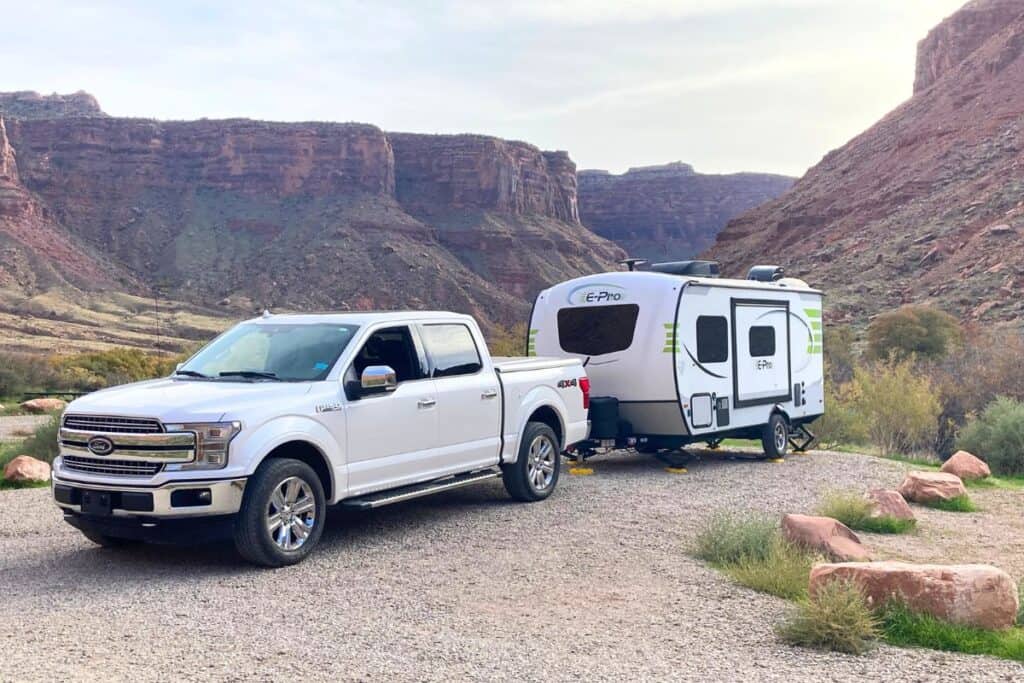
Boondocking, or camping off-grid without hookups, is an increasingly popular way to experience the freedom and solitude of RV camping.
However, while boondocking offers the opportunity to explore remote locations and immerse yourself in nature, it also requires careful planning and preparation to ensure a safe and enjoyable experience.
In this section, we’ll delve into essential boondocking and off-grid RV travel tips to help you make the most of your adventures.
24. How to Find Boondocking Spots: Off-grid Roaming
Boondocking can be a great way to enjoy RVing as well as save some money by avoiding expensive campsites.
However, there are many factors you need to consider when boondocking and one of the most important and sometimes challenging (especially on the East Coast) is finding a place to boondock.
This is where apps and websites come in like Campendium , FreeCampsites.net , or iOverlander , which are resources dedicated to locating free or low-cost off-grid campsites.
These resources often include user reviews, photos, and detailed information about each site.
Beyond these apps and websites though, public lands, national forests, and Bureau of Land Management (BLM) land are always good places to check, as these areas often allow boondocking for a specified number of days.
It’s important to verify stay limits and restrictions before setting up camp though, respect posted private property signs, and obtain any necessary permits or permissions before camping on public lands if required.
25. Conserve Power & Water: Sustain Your Stay
One of the most important practices when boondocking is conserving power and water, as most boondocking sites lack RV hookups.
This means you’ll be relying solely on your RV’s self-contained resources.
The good news though is that there are many things you can do to conserve resources to extend your stay.
Best Ways to Conserve Power While RV Camping & Boondocking:
- Install or add additional roof-mounted solar panels.
- Invest in portable solar panels for more flexible power options.
- Upgrade your RV house batteries from lead acid to AGM or lithium.
- Invest in portable power banks to provide additional auxiliary power.
- Invest in a portable 30-amp or 50-amp RV generator .
- Convert old incandescent RV lighting to modern LED lighting.
- Use a battery monitor to keep track of your electricity usage and battery levels to promote more mindful usage.
- Unplug phantom loads by unplugging devices like TVs, microwave ovens, and chargers that continue to draw power even when turned off.
- Limit inverter use and turn off when not needed, as inverters which convert DC battery power to AC for household devices are inefficient and draw more power.
- Whenever possible, cook outside using a portable gas stove or grill to keep the interior cooler reducing the need for air conditioning.
- Instead of relying on air conditioning, use windows and vents to create a cross-breeze during cooler parts of the day to maintain comfortable temperatures.
- Since water pumps use electricity, conserve water to minimize pump use.
Best Ways to Conserve Water While RV Camping & Boondocking:
- Implement water-saving techniques like using a basin to wash dishes, taking military showers, and turning off the tap while brushing your teeth.
- Instead of running water, use a spray bottle to rinse dishes.
- Place a container in the shower to catch water as it warms up.
- Install a water miser on your RV to automatically recycle the water while you’re waiting for warm water.
- Install low-flow faucets and shower heads.
- Use paper plates to reduce the need for dishwashing.
- Buy one-gallon jugs of drinking water when stocking up on groceries to add additional water supply to your camper.
- Set up a system to capture and purify rainwater for non-potable uses like watering plants, washing outdoor gear, or flushing toilets.
- Consider eating more plant-based meals, which generally require less refrigeration and water for cooking compared to meat-based dishes.
- Make sure everyone in the RV including children understands the importance of water conservation and practices these water-saving tips.
26. Practice “Leave No Trace” Principles: Leave it Better than You Found it
Whether RVing, camping, or just taking a stroll through nature, it’s all our responsibility to maintain the beauty and integrity of these natural areas, not only for our enjoyment but for the enjoyment of future generations.
So make sure to pack out all trash and dispose of it properly, either in designated receptacles or by taking it with you when you leave.
It’s also important to use existing campsites and fire rings whenever possible to minimize your impact on the environment.
If you must build a campfire, keep it small and contained within an existing fire ring, and ensure it’s completely extinguished before leaving.
It’s also important to respect fire bans and follow local regulations to prevent wildfires.
27. Prepare for Emergencies: Ready for Anything
Preparing for emergencies is crucial when boondocking, as you will more than likely be far from immediate assistance.
Because of this, you should have a well-stocked first-aid kit like this one on Amazon , as well as prescription medications, and any items specific to your family’s needs.
You should also pack emergency supplies like extra food, water, and warm clothing in case of unexpected situations or extended stays.
It’s also a good idea to have backup communication devices, such as a satellite phone or two-way radio, to stay connected in areas with limited cell service.
Finally, always make a friend or family member outside of your camping party aware of your general location and direction of travel, in case search and rescue need to locate you in an emergency situation.
28. Utilize Reflective Window Covers: Reflect & Conserve
Utilizing reflective window covers can help regulate the temperature inside your RV while boondocking.
These covers reflect sunlight and heat, keeping your RV cooler during hot days and reducing the need for air conditioning.
In colder weather, reflective window covers can also help insulate your RV, retaining heat and minimizing the need for heating.
Choose covers that are specifically designed for RV windows and are easy to install and remove as needed.
29. Pre-cool Your Food & Refrigerator: Start Cool, Stay Cool
Pre-cooling your food and refrigerator before embarking on a boondocking trip can help conserve power and ensure your food stays fresh longer.
Turn your refrigerator to its coldest setting and allow it to run for several hours or overnight while still connected to shore power.
This will help your refrigerator maintain its temperature more efficiently once you switch to off-grid power sources like 12V, propane, or a generator.
In addition, try to minimize the number of times you open your refrigerator door while boondocking to prevent cold air from escaping.
30. Pack Extra Water Containers: Water Wise
Packing extra water containers is a great way to extend your boondocking stays and ensure that you have a sufficient supply of fresh water.
In addition to your RV’s built-in water tank, bring along several portable water containers like jerry cans that you can fill up before heading to your boondocking site.
These containers can be used for drinking water, cooking, and hygiene purposes, and can also serve as a backup supply in case of emergencies or unexpected situations.
Choose containers that are durable, easy to transport, and rated for drinking water like this popular option on Amazon.
Tips for RV Traveling with Kids

Traveling with kids in an RV can be a great way to create lasting family memories and introduce your children to the joys of outdoor adventure and travel.
However, it also comes with its own set of challenges, from keeping kids entertained during long drives to ensuring their safety and comfort in new environments.
In this section, we’ll explore a range of RV travel tips specifically tailored to families with children.
31. Create a Kid-friendly Space: Kiddie Corner
Creating a kid-friendly space in your RV can help children feel more comfortable and engaged during your travels.
Designate a specific area for play, such as a dinette or a corner of the RV, and equip it with age-appropriate toys, games, and books.
This will give your kids a sense of ownership and provide them with a familiar space to retreat to when needed.
For sleeping areas, use bed rails or safety harnesses to prevent falls and ensure a secure sleeping environment.
Provide each child with their own storage space, such as a dedicated drawer or cubby, to help them stay organized and maintain a sense of personal space within the RV.
32. Plan Kid-friendly Activities: Fun for the Little Ones
Planning kid-friendly activities is key to keeping your children entertained and engaged during your RV adventures.
Research campgrounds and destinations that offer amenities like playgrounds, pools, or kid-friendly attractions.
This will give your children opportunities to burn off energy and socialize with other kids.
Best Ways to Entertain Kids While RV Traveling:
- Hold a mini-scavenger hunt around the campsite using natural items like leaves and rocks.
- Create a travel journal where they can write and draw about their experiences each day.
- Organize a photo challenge with a list of items or scenes they have to capture on camera.
- Bring along board games and card games for evening entertainment.
- Set up a portable projector for outdoor movie nights under the stars.
- Teach them to use binoculars for bird watching or stargazing.
- Have a craft kit ready for making friendship bracelets or simple art projects.
- Download audiobooks or podcasts suitable for children to listen to during long drives.
- Play classic car games like “I Spy” or “20 Questions.”
- Use educational apps on tablets that can teach them about the geography or history of your travel locations.
- Organize nature walks to explore and learn about the local environment.
- Plan simple cooking activities where they can help make meals or snacks.
- Provide them with a map and compass for a basic lesson in navigation.
- Create a “treasure box” filled with small toys or treats they can earn through good behavior or completing educational tasks.
- Play educational games that involve the places you’re visiting, like state capitals or landmark trivia.
- Engage them in planning the itinerary by letting them pick activities or stops for the day.
- Have them help with navigating by reading road signs and tracking progress on a map.
- Bring a small, portable pool for quick and easy fun at the campsite.
33. Maintain a Routine: Rhythm of Life
Just like adults, kids crave routine.
Maintaining a routine while traveling in an RV can help provide a sense of stability and normalcy for your kids.
Stick to regular meals and bedtimes as much as possible, even if your daily activities vary. This will help regulate your children’s energy levels and ensure they get enough rest.
Schedule daily quiet time or naps to give everyone a chance to recharge and relax.
Plan educational activities or road-schooling lessons to keep your kids learning and engaged during travel days.
34. Involve Kids in RV Life: Campers in Training
Involving your kids in RV life can help them feel more connected and invested in your travels.
Assign age-appropriate chores, such as sweeping the floor or organizing their personal belongings, to give them a sense of responsibility and ownership.
Teach them about RV maintenance and safety, such as checking tire pressure or properly disposing of waste, to help them understand the importance of taking care of your home on wheels.
Encourage your kids to help plan trips and activities, giving them a voice in the decision-making process and fostering a sense of excitement and anticipation.
35. Pack Essential Kid Gear: Child’s Play
Packing essential kid gear is a way to ensure your children’s comfort and well-being during your RV travels.
Bring favorite comfort items, such as blankets or stuffed animals, to help your kids feel secure and at home in new environments.
Stock up on healthy snacks and drinks to keep your children nourished and hydrated during long drives or outdoor activities.
Have a well-stocked first-aid kit with kid-friendly medications, such as pain relievers and antihistamines, to address any minor health issues that may arise.
36. Prioritize Safety: Safe & Sound
While safety is always important when RV traveling, when there are kids on board it becomes even more important.
Teach your children essential RV safety rules and emergency procedures, such as how to exit the RV quickly in case of fire and how to call for help.
Use appropriate car seats or restraints for younger children while driving to ensure their safety on the road.
Monitor your kids closely during campfire and outdoor activities, ensuring they understand the importance of staying a safe distance from flames and respecting wildlife.
Jason is an avid lover of RVs and the RV lifestyle. He is both a writer and editor for RV Owner HQ and has been RVing and camping for over 20 years.
Recent Posts
10 Family-Friendly RVs with Bathtubs That Feel Like Home
RVs with bathtubs can make all the difference when traveling and camping, as they provide added luxury and comfort, especially when traveling with kids or pets. No more struggling with tiny shower...
36 Unique RV Gift Ideas For Every Budget: $10 to $100
Are you hunting for unique RV gift ideas for your favorite RVer? If so, you've come to the right place. Finding the perfect RV present can be as tricky as backing into a tight campsite. So, we...

How to Live and Travel Full-Time by RV
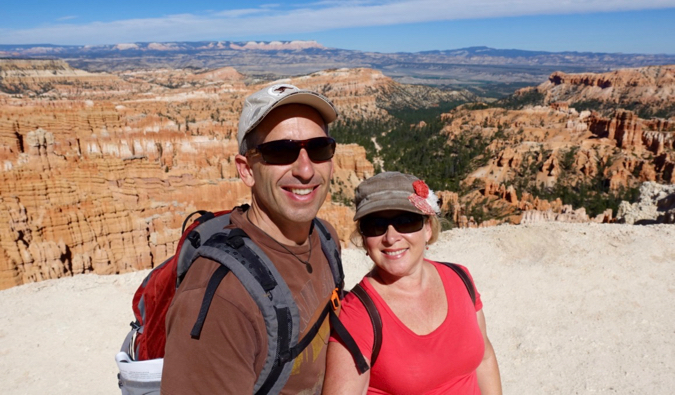
Over the past few years, there has been an explosion of people giving up the daily grind to live and travel in vans, RVs, and other nontraditional abodes. While traveling in an RV has been something people have been doing for decades, new sharing economy websites , better resources online, more modern vans, and a growing community that can provide support have made it easier for anyone to travel full-time in an RV.
What used to be traditionally and predominantly an activity for older, retired, or family travelers is now something people of all ages are trying to do.
One just has to look up #vanlife on social media to see!
(An aside: I hate the #vanlife movement. The faux Instagram movement does nothing for me. Just a bunch of millennials searching out that perfect sponsored photo and talking about how woke they are (for the most part)).
But #vanlife aside, RV travel is a wonderful way to see the world.
“How do you travel in an RV?” is one of the questions I’m most asked.
So today, we’re going to the experts and talking full-time RV with nomads Marc and Julie from RV Love . This couple joined my blogging program a few years ago, hoping to find a way to spread the gospel of living and traveling in an RV to the wider world. (Spoiler: they did. And they just published a book with Simon & Schuster about it too! )
They’ve been driving around in their RV for nearly five years and, today, they share their wisdom about how to travel by RV:
Nomadic Matt: Tell us about yourselves! How did you get into this? Marc and Julie : We’re Marc and Julie Bennett, full-time RVers since 2014, living, working, and traveling in our motorhome as we explore North America and the world! We met on the dating website eHarmony while both living in Colorado in 2010, married in 2011, and hit the road three years later!
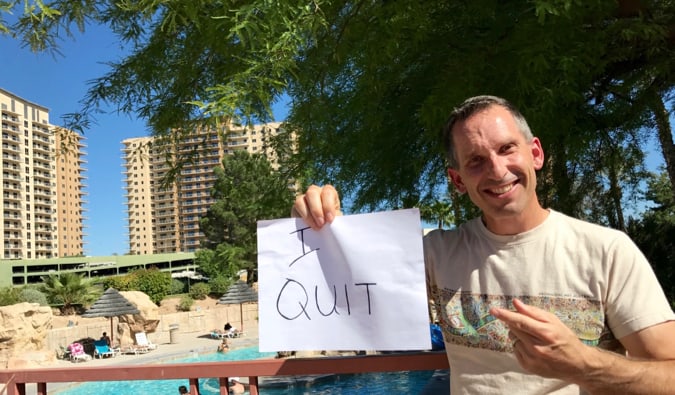
Why did you pick traveling in an RV as your way to get around? We knew we wanted to do a lot more extended travel while we were still working. We get such little vacation time here in the USA , and we didn’t want that to limit our lives. So we started exploring different ways to bring more travel and adventure into our everyday life without Marc having to give up his job as project manager of operations, which he was able to do from home.
We considered international travel, but there were two main reasons why wasn’t a fit: the challenge of time zones, and more specifically, we wanted to travel with our dog Coda. Plus, we love to drive, so RVing was really the ideal solution for us. We love that wherever we go, we’re always home, and we’re not living out of suitcases.
We’re both passionate about driving, so it makes sense that we would choose to live and travel by RV, although we usually prefer more sporty rides when it comes to entertainment, as we both have a love for sports cars and convertibles.
What’s life like living and traveling around in an RV? We just entered our fifth year on the road full-time as RVers, and we recently changed from a 2012 36’ gas Class A motorhome to a 1999 40’ diesel motorhome! We bucked the trend and went bigger (and older and cheaper, but much higher quality), and we’re actually doing a complete remodel of our RV this summer.
Traditionally, we spend about 80% of our time in campgrounds and about 20% dry camping, but we recently installed a big lithium battery bank and solar system on our RV, so we plan on spending a lot more time camping off the grid out in nature in the coming years. We try to spend 2-3 weeks in each location, but that varies on where we are, the weather, and what projects we have on our plates. We moved pretty fast in our first 3+ years, having visited all 50 states while still working full-time.
This year, we have so many big and exciting projects on our plates, we’re really feeling the need to slow down, catch our breath, and get caught up on our content! We tend to wing our plans a lot more than we used to, as we’re more comfortable and confident RVers now.
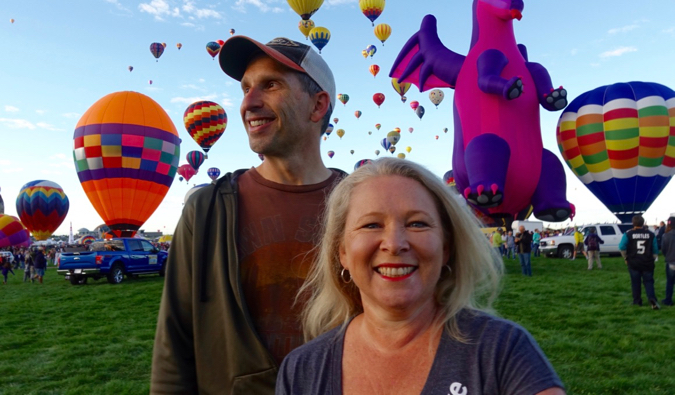
An average day depends on whether you have to work or not. We love that we no longer have a commute and that the views outside our windows change every week or so. Nature is a big part of our everyday life, so it can be easier to get in more walking, hiking, biking, or kayaking. We definitely get to see more sunsets — that’s a big thing for a lot of RVers.
RV life is still life. You need to go grocery shopping, make meals, do laundry, pay bills, and do housework. Then there’s RV maintenance and repairs! There’s almost always something to do on an RV — tighten screws, replace parts, troubleshoot issues, check your tire pressure, fix whatever’s broken.
Upon arrival at a destination, it usually takes less than 30 minutes to set up. It may sound like a hassle, but if you’re staying a week or more, it becomes a small percentage of your time. And RV life can be as social as you like. We tend to mostly stay in campgrounds, so it’s not too difficult to meet new people. And we also go to RV rallies to meet up with our RVing friends, who we stay in touch with online. It can take a little time to build your RV community, but if you put yourself out there, it can happen pretty quickly!
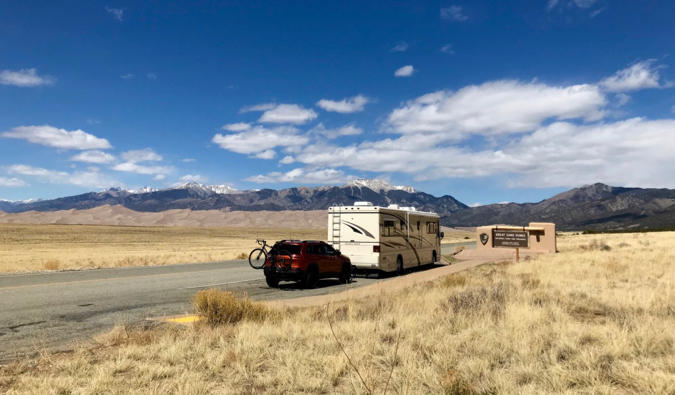
Do you need a lot of mechanical skills to do this? When you’re traveling around in an RV, if you aren’t already handy, you’ll learn to be! It’s definitely an advantage to become somewhat mechanical and familiar with simple tools. The RVing community is very helpful and supportive when it comes to finding answers for issues you may have — whether online (in social media groups) or in person. At RV parks and campgrounds, you will usually find someone reasonably experienced and mechanically oriented nearby. If you are not skilled or it’s a complex job, you can usually find a local or mobile repair person to perform needed maintenance or repairs.
We recommend sticking with a less complex RV when starting out. The more simple the RV, the more reliable and easy to fix they are likely to be, and you can tackle many repairs yourself. As full-time RVers driving a Class A motorhome, we only need to take our RV into repair facilities 2-3 times per year on average.
Many RV repairs are fairly simple, and that’s when YouTube and Google are your friends! One of our favorite YouTube channels is the RV Geeks , who make DIY how-to videos to help you make simple repairs and upgrades. It’s often more convenient (and definitely cheaper) to do many RV repairs yourself. And you may even want to consider an extended service contract to cover your RV for repairs outside of the manufacturer’s warranty period and help limit repair costs.
Are there any personality traits you think are necessary for living in an RV? Flexibility, adaptability, resourcefulness, and a sense of humor! Just like any other kind of travel, things don’t always go the way you want , RVs break (or break down), and travel plans go awry when you least expect it, so you need to be able to find a creative solution, often on the fly. It really helps to be handy or at least be willing to have a go at DIY fixes. RVers learn to become much more self-sufficient pretty quickly.
Anyone can RV if they really want to. It doesn’t matter about your age, life stage, relationship status, or financial situation. In our book, we share the inspiring story of 69-year-old Frieda who hit the road solo after her husband passed away and drove to Alaska to celebrate her 70th birthday. She’s been on the road for two years now and is still going strong.
Another great case study from the book is Nik and Allison (31 and 30). They share why they decided to RV and explore the country before they started a family. They follow the FIRE philosophy (Financial Independence, Retire Early) and save more than 50% of their income so Nik can be a stay-at-home dad. RVing for a year and a half while still working allowed them to do a lot of travel affordably while keeping them on track with their financial and life goals.
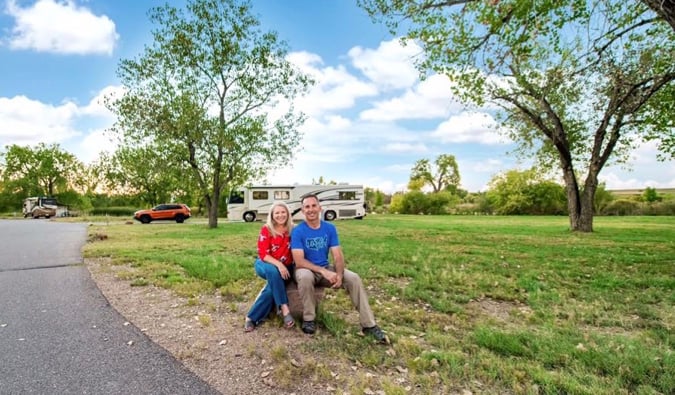
There really is no “one way” to RV, just the right way for you. That’s why, when writing our book Living the RV Life: Your Ultimate Guide to Life on the Road , we wanted to create a roadmap for people that would help them hit the road and thrive, keeping them on track with their personal goals while they’re doing it. That’s been a big part of our own success. We’re almost five years in now and still living and loving the RV Life. Now we’re showing others how they can do it too.
A lot of people are embracing RV/van life these days. Why do you think that is? We think it’s a perfect storm of several things colliding simultaneously:
- A lot of people are questioning the traditional American Dream as a path to success or happiness — the idea of postponing your life, travels, and experiences until retirement just doesn’t really make sense, and of course, the future is promised to no one. Why not travel while you have youth and health on your side?
- Technology is enabling us to live and work from pretty much anywhere, and more companies are allowing people to work remotely, and more people are starting their own businesses.
- Then there’s social media and FOMO! With the increased awareness that RV or van life is possible through watching people’s YouTube channels, Facebook pages, and Instagram feeds, other people are beginning to realize you can travel and see cool places, and live or work in forests or by lakes — and they want to do it too. America has long been famous for iconic road trips — and RVs and van life offer the ultimate freedom : exploring the country on wheels.
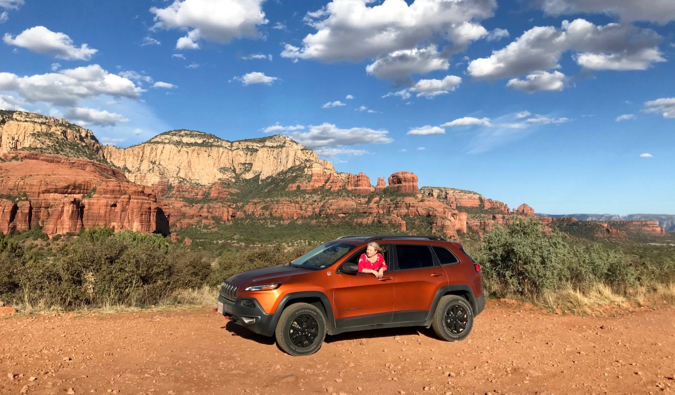
How much money will people need before they dive into RV life? It’s a good idea to pay off as much unsecured debt as possible before hitting the road. Less debt lightens your load and allows you to really enjoy the freedoms of RV life.
It all depends on how you want to RV, and your budget. Generally, we recommend people try to save up a few months of living expenses to get started, and as a backup for unforeseen challenges and expenses. Life happens, and you just never know when you may be hit with an unexpected expense or expensive RV repair.
As a guide, as long as you plan and budget carefully, and make a good RV purchasing decision, it’s possible to RV full-time for about $2,000–$3,000 per month. Some do it for less, and others do it for way more. But across the board, we find most RVers end up spending about the same in their RV life as they did in their regular life.
Just like in traditional life, you just have to plan to live and travel within your means. Plus, your ability to earn an income while you travel is a huge factor. If you can work from the road while you RV — as was the case for us — it can be a pretty simple trade.
For example, we sold our townhome and traded our mortgage payment, HOA, utility bills, and two car payments for:
- A used RV, which we financed
- A less-expensive car that we paid cash for
- Campground and fuel expenses
What we previously spent on home repairs and maintenance for our home is now redirected to our RV. Same goes for RV insurance and roadside assistance. We tend to spend a bit more on eating out and entertainment, as we’re always on the move and experiencing new places. But it’s easy to save money by making meals in your RV, and there’s no shortage of things you can do for free, like hiking, biking, and kayaking.
Many people (like us) are able to work remotely with just an internet connection. Some work seasonally, then take a few months off to travel and explore. Other careers, like nursing, hospitality, agriculture, and construction are highly transferable to new locations, especially for seasonal work. For some lines of work, it can actually be easier to find jobs by having the ability to follow the work around the country.
We have met people who live full-time in vans or RVs frugally, for less than $20,000 per year. And we have seen others who spend well over $60,000 per year. Like all other forms of travel (and life!), expenses are variable, depending on how you do it.

What tips do you have for people who aren’t sure what RV, van, or trailer they should get? Buying an RV can be expensive, and buying the wrong RV can be even more expensive! Like anything with wheels, RVs depreciate (hard), and so doing your research in advance pays off. Before you even set foot on an RV dealer’s lot or go check out the RV you found on Craigslist, ask yourself:
- Who is traveling with you?
- How much do you plan to travel? (weekends, part-time, full-time)
- Where do you want to go? (campgrounds and RV parks or off-grid camping in national forests?)
Generally speaking, you’ll want to choose the smallest RV that you feel that you can comfortably live in. Smaller RVs offer more flexibility to access more places. Larger RVs are more comfortable for extended travel but will be more limiting in terms of where you can take them, especially if you want to stay in national parks and do off-grid camping.
Don’t overinvest in your first RV — it’s the one that will teach you what is most important to you and your travel style. Start out by buying used. You will avoid the steepest part of the depreciation curve. Plus, you’ll have a much better idea of what’s important to you when it comes time to buy your second RV. It’s possible to nail it with your first RV purchase, but not without a lot of research and clarity around your priorities .
What are some common pitfalls to avoid when starting out? Full-time RVing is not a vacation, it’s a lifestyle. It’s exciting when you start. You want to go everywhere and see and do everything. Try to create a sustainable travel pace from the beginning. Stay longer in an area. It’s cheaper – in terms of fuel and campground fees – and you’ll really be able to immerse yourself, explore, and even feel like a local for a while.
Second, it’s easy for people to think they need a big RV to be comfortable, especially when coming from a bigger home. In the RV lifestyle, your environment and views are constantly changing, so your world feels a lot bigger, even if your living space isn’t. It’s easier to live in a smaller space than you might expect, especially with way less “stuff.” Remember our advice above when it comes to choosing the right RV, so you can avoid that expensive mistake.
And finally, it can be hard to resist buying gadgets and gear before you even buy your RV! Every RV has cupboards and storage of different sizes and shapes, and you won’t know what fits where until you have your RV. Save money by hitting the road with the essentials, then spend some time traveling before investing in too many upgrades or gear. You’ll want to make sure they are going to be a fit for your preferred travel style. You can always buy what you need as you go. Don’t take too much stuff! You need less than you think and can get what you need as you travel.
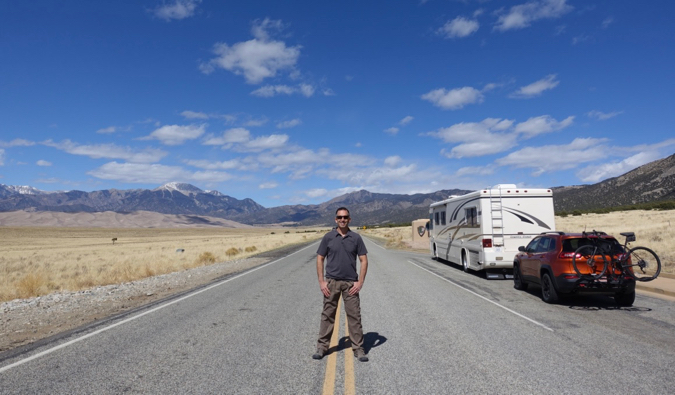
Do you have any recommended companies for vans/RVs? What about resources for finding where to camp/park? It’s a good idea to consider renting an RV or van first, to see if you even like the lifestyle. You can rent RVs from rental companies or from private individuals using a platform like RVshare , which gives you more variety in the types of RVs you can choose from.
This is really useful for helping you decide what kind of RV is right for you, before buying one. It may seem expensive, but making the wrong decision isn’t cheap either! Many large RV dealerships rent RVs, there are large rental chains like cruiseamerica.com or www.roadbearrv.com , but if you want to rent an RV from individuals for more variety, consider doing so via rvshare.com .
It is difficult to make specific recommendations about buying RVs, as there are hundreds of manufacturers, models, and types, and RVs are not like cars. The options, features, and price range of RVs vary widely. That said, we generally recommend buying a preowned RV, as they are usually more affordable, and, contrary to cars, you will generally experience fewer issues with a well-maintained preowned RV than with a brand-new unit. That’s because every RV — much like building a new house or condo — will have a “punch list” of items that need to be fixed for the first few months (or more) after you drive it off the dealer’s lot.
You can find RVs at RV dealers, on websites like RVTrader.com , as well as on Craigslist or Facebook Marketplace, and from friends and family. Local RV parks often have a community notice board of RVs for sale, too.
If you want to camp for free on public lands, there are websites like Campendium.com and Frugal Shunpiker’s Guides to find free camping areas. And there are thousands of RV parks and campgrounds around the country, which you can you find online, through apps, and in camping directories.
You can also look into camping memberships that offer discounts on your stays. For example, we spend a lot of time in a campground membership network that literally saves us thousands of dollars per year. Other websites and apps we recommend include CampgroundViews.com , Campendium, and AllStays. There are a ton out there, and you can find many more resources in our book and at our website, RV Love of course! 🙂
If you want more information, Marc and Julie Bennett are RVers who live, work, and travel from the road full-time, and since hitting the road in 2014, have visited all 50 USA states, plus Canada and Mexico. They are co-authors of Living the RV Life: Your Ultimate Guide to Life on the Road , and you can follow along on their journey via their website RV Love as well as their social media channels!
If you’d like to dive deep and get hands-on help on starting your own RV life, they also run online courses at RVSuccessSchool.com . As a Nomadic Matt reader, you can get 10% off their course with the code NOMADICMATT. Just input the code when you sign up!
Book Your Trip: Logistical Tips and Tricks
Book Your Flight Find a cheap flight by using Skyscanner . It’s my favorite search engine because it searches websites and airlines around the globe so you always know no stone is being left unturned.
Book Your Accommodation You can book your hostel with Hostelworld . If you want to stay somewhere other than a hostel, use Booking.com as it consistently returns the cheapest rates for guesthouses and hotels.
Don’t Forget Travel Insurance Travel insurance will protect you against illness, injury, theft, and cancellations. It’s comprehensive protection in case anything goes wrong. I never go on a trip without it as I’ve had to use it many times in the past. My favorite companies that offer the best service and value are:
- SafetyWing (best for everyone)
- InsureMyTrip (for those 70 and over)
- Medjet (for additional evacuation coverage)
Want to Travel for Free? Travel credit cards allow you to earn points that can be redeemed for free flights and accommodation — all without any extra spending. Check out my guide to picking the right card and my current favorites to get started and see the latest best deals.
Need Help Finding Activities for Your Trip? Get Your Guide is a huge online marketplace where you can find cool walking tours, fun excursions, skip-the-line tickets, private guides, and more.
Got a comment on this article? Join the conversation on Facebook , Instagram , or Twitter and share your thoughts!
Disclosure: Please note that some of the links above may be affiliate links, and at no additional cost to you, I earn a commission if you make a purchase. I recommend only products and companies I use and the income goes to keeping the site community supported and ad free.
Related Posts

GET YOUR FREE TRAVEL STARTER KIT
Enter your email and get planning cheatsheets including a step by step checklist, packing list, tips cheat sheet, and more so you can plan like a pro!


- Books & Merch
- Gear We Use
- National & State Parks
- Best RV Campgrounds in New Hampshire
- Best RV Campgrounds in NC Mountains
- Best Florida Beach RV Campgrounds
- South Dakota
- The Great Lakes
- Campers Swear By This Portable Device That Keeps Dogs Safe -The Best Portable Dog Fence for Camping (2024)
- Mosquitos and bugs
- Camping Clothes
- Camping Gifts
- Camping Internet
- 5 Best RV Backup Cameras for RV & Trailer
- 7 Best Screen Tents for Camping (2024)
- Best RV Campgrounds in California
- 5 Best Key West RV Parks
- 9 Best RV Campgrounds in New Jersey
- Camping Reservations
- Campground Comparisons
- Cheap or FREE RV Camping Sites
- Best RV Campground Memberships & Clubs
- Boondocking 101
- Boondocking Adventures
- RV Internet
- What Do Flamingos and Upside Down Pineapples Mean?
- Where to Find FREE or Cheap RV Sites Camping
- RV Winter Camping
- RV Show List for 2024
- 17 Best Camper Vans 2024 (New Class B RVs Available!)
24 Best Travel Guides for RVers
If you're planning to hit the road, you should hit these books first these are the best travel guides for rvers….
- 1 If you're planning to hit the road, you should hit these books first! These are the best travel guides for RVers…
- 2.1 1. Guide to National Parks of the United States
- 2.2 2. 50 States 5000 Ideas
- 3.1 3. Where Should We Camp Next?
- 3.2 4. National Geographic Road Atlas
- 3.3 5. Rand McNally Large Scale Road Atlas
- 3.4 6. Casino Camping
- 3.5 7. Our Official RV Lifestyle Travel Guides – ebooks (not print book)
- 4 We're OVER 15,000 members in our NEW Community!
They say for one to travel, all they have to do is open a book. I, myself, have discovered incredible places, both real and imaginary, thanks to countless books I’ve read over the years.
As RVers, Jennifer and I are always looking for resources to improve our travels, and books have been a big part of our travel kit.
So, we’ve put together a list of must-have travel books for RVers. This list includes incredibly helpful atlases and guides for any RVer or road traveler.
We use affiliate links and may receive a small commission on purchases at no added cost to you. Thank you for your support.
21 of the Best Travel Guides for RVers
To make it easy for you, I’ve made a “ shopping list ” of these books on Amazon. So you can just click that shopping list link if you want to buy one or more of these books. Or, you can buy them individually by clicking their titles below.
At the end, I grouped a bulleted list of very thorough travel books under one category: the RV Lifestyle guides. These are topic- and region-specific travel books that will help you beyond guiding you where to go on your travels.
1. Guide to National Parks of the United States

National parks are perhaps the biggest inspiration for people to jump in an RV and hit the road. There is no better way to see the vast variety of gorgeous landscapes our country has to offer than by visiting its national parks.
This best-selling guide was created by the leader of all things natural: National Geographic. With that of authority behind it, you know it’s very well-researched with enticing photos to get you excited.
It has over 300 photos and 80 colorful maps of the 59 national parks in the United States. Its useful content includes travel planning tips, itineraries, professional insights into the parks, and more.
It’s truly a must-have for every RVer, both new and veteran.
2. 50 States 5000 Ideas

This is another National Geographic guide that’s definitely worth buying. As you know, Jennifer and I love serendipitous travel, where we just stumble upon and embrace unexpecting things. But this book is excellent for creating a loose or even detailed itinerary.
It outlines where to go, when to go, what to see, and what to do. Its suggestions include everything from dude ranches to out-of-the-way museums, beaches to national parks, dinosaur trails to the oldest street in NYC, and more.
It definitely has something for everyone in each state.
Mike and Jennifer's RV Lifestyle hat collection

Who needs a hat? You do! Dad hats aren't just for dads. This comfy one's got a low profile with an adjustable strap and curved visor. Just the thing to wear on your next RV Lifestyle adventure.
3. Where Should We Camp Next?

This camping guide is for people who are planning a “family-friendly budget-conscious summer camping trip.” It features more than 300 of the best camping and glamping spots in all 50 U.S. states.
(Check this out if you don’t know the difference between glamping vs. camping .)
Whether you like to camp or glamp, this is a useful resource for finding amazing campgrounds and unique accommodations.
4. National Geographic Road Atlas

Every RVer needs a quality atlas. Yes, our electronic devices and GPS systems are incredibly helpful for finding our way. However, devices and GPS fail. Phone signals fail, and batteries die.
That is why every responsible RVers should own a road atlas, and this is the one we recommend. To no surprise as to why we like it, it’s created by National Geographic.
This atlas, of course, includes detailed maps, but it also has guidebook-like recommendations. That’s why we recommend this road atlas more than any other.
Well, this and one other really great atlas…
5. Rand McNally Large Scale Road Atlas

Rand McNally is known for mapping, navigation, and road travel so it’s no surprise they’re on this list. They have quite a few resources available for RVers, but we like this large-scale road atlas.
The maps of every U.S. state in this atlas are 35% larger than the standard atlas version. So, it’s perfect for older travelers or road-weary eyes.
It also includes over 350 detailed city inset and national park maps. This one features: “Rand McNally presents The National Parks by Decade, a review of park history that begins more than a century ago, with the first wild and wonderful place to achieve park status—Yellowstone.”
6. Casino Camping

It’s no secret that a lot of RVers like to gamble. So, this is an excellent resource for those who want to shape their travel plans around slot machines and table games.
But, this is actually also a great resource for boondockers or anyone looking for a free or cheap place to park overnight . This guide outlines RV-friendly casinos throughout America.
Each casino description includes:
- Contact information
- Description
- Gaming, food & entertainment
- Lodging & RV parking information
- Driving directions
7. Our Official RV Lifestyle Travel Guides – ebooks (not print book)

If you didn’t know already, Jennifer and I created an entire series of RV travel ebooks. From beginner guides to 7-day adventure itineraries, we’ve used our decade of living the RV lifestyle to help you make the most of yours.
You can see our whole assortment of RV Travel ebooks here .
Our guides include:
- A Newbie's Guide to the RV Lifestyle (new in 2024)
- RV Buying Secrets
- The Beginners Guide to Boondocking
- The Complete Guide to Boondocking (Print Version)
- The Ultimate Guide to Cheap or Free RV Camping Sites
- Boondocking & Free RV Camping Ebook Bundle
- Winter RV Camping Guide- Why Stop RVing Just Because It's Cold? (new in 2024)
Our adventure guides outline complete itineraries for a wide range of beautiful destinations. They cover things to do, places to see, where to stay, and so much more! The destinations include:
- Adirondack Park and Finger Lakes
- Bourbon Trail in Kentucky
- Florida Keys
- Florida’s Atlantic Coast (updated July 2024)
- Florida’s Gulf Coast
- Great Lakes
- Southern Utah
- Michigan’s Upper Peninsula
- Michigan's Lower Peninsula
- Natchez Trace
- Yellowstone National Park
- Yosemite National Park (new in 2024)
It may seem self-serving to include our ebooks on this print book list, but, in truth, we painstakingly created these guides with fellow RVers in mind. We created these guides for you .
These aren’t just some 10-page ebooks that other sites try to pawn off on you, but rather highly in-depth travel guides. We experienced all of these things first-hand, putting us in a unique position to highlight the best things to do and see.
Our goal was to save you hours (if not days!) of planning and hand you tried-and-true itineraries on a silver platter. If you’re interested in more than one, be sure to check out the bundles. We hope you enjoy these adventures as much as we have and still do!
We're OVER 15,000 members in our NEW Community!

We have a Space for all sorts of things you want to know as an RVer, including Boondocking, Travel Planning, Electrical, Plumbing, Traveling with Pets, Gear, and more.
You can join each Space individually and only see what's being discussed in just that Space. Or you can see everything in the main Feed.
You can watch livestreams that are focused on one Space or another – like we recently did for Internet on the Road !
It's a calm, well-organized, friendly space to meet other RVers who might be traveling near you!
Join us https://community.rvlifestyle.com
Last update on 2024-09-10 / Affiliate links / Images from Amazon Product Advertising API
Published on 2024-07-15
Mike Wendland is a multiple Emmy-award-winning Journalist, Podcaster, YouTuber, and Blogger, who has traveled with his wife, Jennifer, all over North America in an RV, sharing adventures and reviewing RV, Camping, Outdoor, Travel and Tech Gear for the past 12 years. They are leading industry experts in RV living and have written 18 travel books.
6 Responses to “24 Best Travel Guides for RVers”
July 19, 2024at8:16 am , Stacey Soos-King said:
These are not useful unless you are travelling within the USA. Are there Canadian versions?
July 17, 2024at7:06 am , Nancy Robinette said:
Would like you all to add a bundle of ebooks where we can choose the ones we want. Example 5 for ? and we could pick our selections.
June 20, 2023at8:43 pm , Amy Nichols said:
All the books listed here are good. We usually cross-reference across many resources. My favorite atlas is DeLorme’s. I always have it open on my lap when we are traveling, and keep an eye out for the next unexpected adventure. We are slowly building our collection for all the states we travel through. DeLorme’s gives us the detail we can’t get from atlases with one-state-per-page (or two), and includes a lot of interesting information. If you can afford them (about $25/state), I recommend them.
June 23, 2023at10:18 am , Team RV Lifestyle said:
Thanks for sharing this, Amy! Team RV Lifestyle
March 29, 2022at4:25 pm , Fred Bretzloff said:
Hello my name is Fred Bretzloff. and I will be in Tennessee looking at property on from the 14th to the 18th and was curious whether you would be in town my wife and I would love to have the opportunity of meeting you so if you could let me know I would appreciate it thank you.
April 01, 2022at9:09 am , Team RV Lifestyle said:
Hi Fred — Mike and Jen really don’t know their schedule right now for those dates. They tend to do a lot of things spontaneously. If they do any meet and greets they will be sure to let everyone know – but they rarely have anything locked in that far ahead and right now aren’t sure. Team RV Lifestyle
Leave a Reply Cancel reply
Your email address will not be published. Required fields are marked *
Related Posts

13 Pro Tips for Attending an RV Show

Do I Need a Special RV Driver’s License? (State Laws)

What Is Travel Decision Fatigue? (& How RVers Overcome It)

This post may contain affiliate links or mention our own products, please check out our disclosure policy
RV Tips and Tricks: 20 Hacks Every Camper Should Know
- Lynne Fedorick
- April 7, 2021
- 59 Comments
Table of Contents
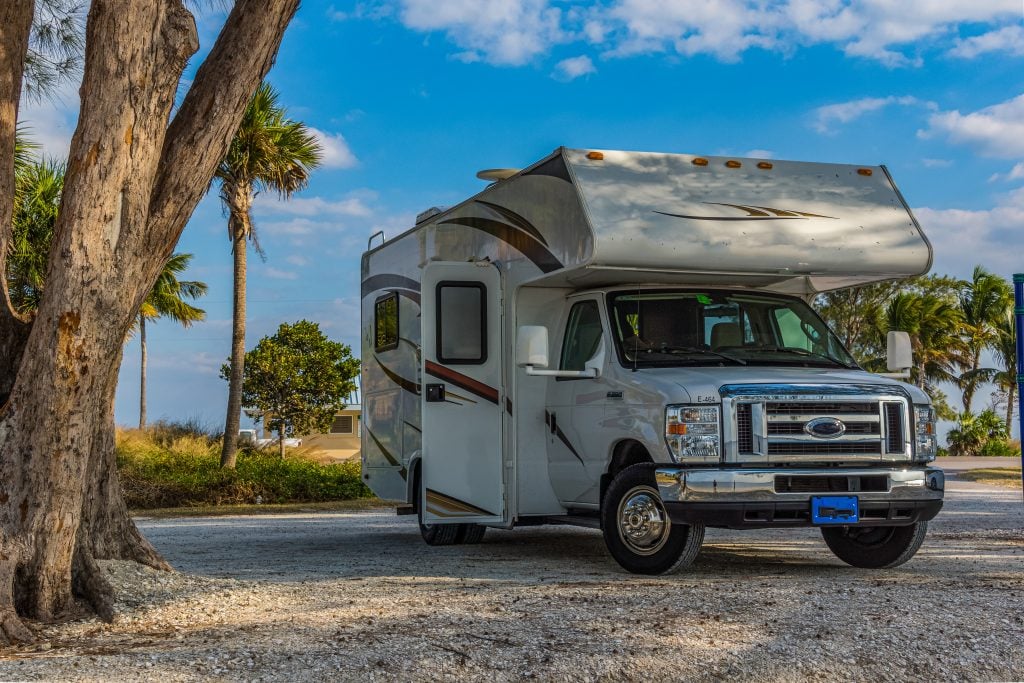
Learn to RV from the Experts
Getting started with your new RV can be daunting. Like anything else in life, it gets easier with experience.
To give you a head start, we’ve compiled this list of 20 RV tips and tricks that are bound to get you out and safely enjoying RV life, without having to go through the experience part.
20 RV Tips And Tricks Every Camper Should Know
These are hacks that every camper should know, regardless of their experience level.
1. Use an RV departure checklist
There is nothing like getting on the road and finding out that you forgot to unplug your shore power cord. There are a lot of things to remember before you pull out.
A visual checklist, either printed or on your smartphone, will help to ensure you don’t forget anything. Print out this free RV Departure Checklist and keep it somewhere easy to access.
2. Know the height of your rig
Find out how high your rig is. Write the height on a label or piece of masking tape, and put it on your dashboard. Watch for low-hanging branches and take note of the height of overpasses before you proceed. Use an RV-safe GPS to make sure you have a safe route.
3. Level your RV before filling your freshwater tank
Leveling your RV before filling your tank will ensure that you are really getting a full tank.
4. Mount towel bars (and other things) on your walls with exterior grade Gorilla mounting tape
Exterior grade Gorilla mounting tape adheres to RV walls much better than Command strips or anything else we’ve found.
5. Use Command broom holders to hold flashlights or wrenches
3M Command broom holders are great for keeping flashlights and wrenches handy in your basement storage areas or inside the RV.
6. Replace your RV showerhead
This trick will help to conserve water, while still having decent water pressure. The Oxygenics showerhead makes it possible to enjoy longer, better showers in the RV. Read more about replacing your RV showerhead from Do It Yourself RV .
7. Use an Instant Pot Pressure Cooker
The Instant Pot pressure cooker will allow you to make almost effortless, delicious meals in a lot less time than traditional cooking methods.
You simply put the ingredients in, set it, and the Instant Pot takes it from there. Bonus: You can vent the Instant Pot outdoors, so cooking won’t add to the humidity levels in your RV.
Get recipe inspiration from Do It Yourself RV
8. Bring a basic tool kit
Be prepared to make minor repairs if you need to by having a basic tool kit with just the essentials. This includes a screwdriver or cordless drill, a few different bits, some screws, an electrical tester, and wrenches like a torque wrench.
9. Pack a hairdryer
A hairdryer can be used for more than just giving you good hair. You can use a hairdryer to thaw frozen pipes or to blow warm air onto cold kindling when lighting a campfire.
10. Pack some pine cones
What? Pine cones?
Yes! Pine cones aren’t just for Christmas decor. Pine cones are also nature’s perfect firestarter and readily burst into enough flames to start kindling when you put a flame to them.
11. Plan an RV-safe route
Use the RV LIFE App and RV LIFE Trip Wizard to plan your route and find amazing camping spots that are perfect for your camping style. Get RV-friendly directions, read reviews, and find important campground information, all in one convenient tool.
12. Turn the propane valve off before you travel
Traveling with your RV’s propane valve open is crazy. Our rolling rigs are subjected to shaking equivalent to an earthquake as we travel. This shaking causes many things to loosen or even come apart, and propane connections and lines can come apart as we travel. This definitely presents a fire hazard in your RV .
13. Pack a first aid kit
Be prepared for emergencies (including the four-legged family members) by packing a first aid kit for both humans and pets.
14. Bring a collapsable storage tote or two
Collapsible storage totes can be used to tote campfire supplies like s’mores ingredients, napkins, glasses, and beverages, and make decent impromptu tables to put campfire essentials on.
15. Bring board games and other activities for family fun
Board games will help your family enjoy time indoors if the weather gets too ugly to play outside. Here are a few great board and card games that you can easily play in the RV.
16. Pack a pizza stone
A pizza stone will help to even out the heat in your RV’s propane oven so you can bake amazing meals. And of course, you can always use it to make pizza! Pizza stones do break, so be sure to protect them by wrapping them for travel.
Find more tips for cooking in your RV oven
17. Repurpose your dishwater
When you are boondocking, your time off-grid and unhooked will be much better if you don’t run out of water. Washing and rinsing dishes uses more water than anything besides your RV toilet, so it makes sense to repurpose your dishwater. Use a basin to wash your dishes, and then use gray water to flush your toilet.
18. Make sure your campfire is really out before leaving it
Abandoned campfires are one of the leading causes of forest fires. Not all of these fires were intentionally left smoldering.
Campfires heat the ground underneath them hot enough to reignite anything combustible in your firepit hours later. No one wants to be “that guy/girl” so use lots of water or dirt to thoroughly smother your campfire when you are done with it.
As a rule of thumb, you should be able to put your hand comfortably on the ground in your fireplace before you leave.

19. Make a headlamp into a lantern
Strap a headlamp (light side in) to a 1-gallon jug of water to make a lantern that lights up your campsite. Opaque, white jugs work best for this camping hack.
20. Wash your clothes as you travel
This camping trick from Travels With Charley: In Search of America by John Steinbeck is so simple and effortless we’ll be using it all the time.
Put dirty clothes, water, and laundry soap into a five-gallon bucket with a tight lid. Make sure the lid is on snug because if it isn’t it makes a huge mess. Find a place in your rig where you can make sure the bucket will stay firmly in place. If you have a place to secure it, even better.
Every bump you hit and turn you take will agitate the clothes in the bucket as you drive, just like a washing machine does. After an hour or two of driving, your clothes will be perfectly clean, ready to be rinsed and hung to dry in the fresh air.
Find more RV mods, hacks, tips and tricks
You can find more RV tips and tricks from the community on iRV2 Forums . There are also lots of RV Youtubers and bloggers that share useful tips on the nomadic lifestyle. Check out this video from CrazyLadyCrankyDog on tips for food storage:
You May Also Like:
Rv speak: a definitive guide to rv terms, our top tips for planting an rv garden, what rvers should expect during the 2024 solar eclipse, embracing the full rv experience: find joy in every moment, catching up with the border hookups, rv snowbirds: should you travel this winter or stay in one spot, unlock your freedom: the 2024 rubber tramp rendezvous by homes on wheels alliance, rvtv continues to expand to new platforms, class a rv vs class c: which one is right for you.

Lynne Fedorick is a freelance writer with 35 years of RVing experience. She specializes in topics such as fulltime RV life, great destinations for RVers, RV organization, RV News, RV tech, and dog behavior/training.
59 thoughts on “ RV Tips and Tricks: 20 Hacks Every Camper Should Know ”
#10 – DEFINITELY NO! Transporting pine cones &/firewood can cause a horrific amount of damage as they can carry beetles that destroy trees. Most campgrounds will prohibit this to protect their trees.
You could buy them after Christmas for a very inexpensive amount of money and not have to worry about the bug issue.
Departure checklist should include closing all overhead exhaust vents tight.
Very very good idea.
If you turn your propane off that means your refrigerator turns off. Then how do you keep your fridge cold?
We found out that the battery for the refrigerator /freezer, despite everything else, will still run off the battery for our front hydraulic lift that we need the juice for hooking up the camper to our truck. Highest setting in fridge before we left, unhooked electricity, then Shut off refrigerator at departure, didn’t want to drain battery, didn’t open again until our next destination. Acted like a cooler!
Leave the door cold and it will stay cold for several hours!
If you’re planning on travelling on BC Ferries between Vancouver and Vancouver Island or to any of the Gulf Islands or up the coast to other ferry stops, you’ll be asked at the ticket booth when you check in how many propane tanks do you have, including a smaller bbq tank. They will tell you by Marine Law and the Dangerous Goods Act that you must close tightly all valves on propane tanks and place the red warning stickers they give you onto the closed valve per instructions given. Maximum two 30# tanks and one bbq tank per vehicle. If you’re carrying more you must contact Dangerous Goods.
We shut propane gas off while traveling and run 12v as the alternator replenishes the RV batteries. When we stop, back to gas.
Some good ideas, but like others have said, i disagree with #12. We leave our gas/fridge on while we travel down the road.
Also, Id be laughing at someone who spent the time to run an extension cord out to a fire ring to blow air on kindling to start a fire.
Thank you Chris. We do too and have done so for many years.
Your fridge will stay cold until you get to your destination IF you keep it closed up! As long as you travel within a 5-6 hours journey & ‘its not too hot out! Put a thermometer in and check it out! You could also use frozen blue blocks to keep things cold in the fridge! Never had an issue – AS long as you turn it on once you get there!!! 😀
Add to your pre-departure check list: 1.Prescriptions and OTC items like aspirin, hearing aid batteries and wax protectors, allergy pills, sunscreen, eye drops ,etc. 2.Adhesives, duct tape, jeweler’s screwdrivers, camera batteries, SD cards, tablet, cell phone and charger. 3. Fire starters, charcoal, propane, portable BBQ grill. 4.Books, magazines, music CD’s, binoculars.
You can get 5 gallon or larger buckets and a threaded lid adaptor, MUCH easier and less messy than trying to replace and remove a press on and pull off lid. Useful for more than just laundry also!
Regarding Gorilla Tape: be sure to read the label.
Unlike Command Strips, GT is permanent, and the instructions warn that removal may cause surface damage.
Secondly, the GT label says not to use for anything deeper than 0.75″ or the bond will be stressed with an increased chance of failure. Most towel bars are more than double that depth, and have a “levered” weight (wet towels) hanging off of them.
Also, it says to use 2″ per 1 lb. of weight. That is considerably less strong per square inch than Command Strips. A 5 lb CS hook only uses a piece of tape that is about 2″ long. We use CS 5 lb. hooks to hang our towels…
Turning off the propane is a bad idea. The reason that I have an RV refrigerator is so that I can keep things cold while traveling. Turning off the propane turns off the fridge.
Your fridge will stay cold until you get to your destination IF you keep it closed up! As long as you travel within a 5-6 hours journey & ‘its not too hot out! Put a thermometer in and check it out! You could also use frozen blue blocks to keep things cold in the fridge! Never had an issue – AS long as you turn it on once you get there!!! 😀
These are the best tips I have read! Thank you for sharing.
The Oxy shower head is a big improvement however the pause valve that comes with it doesn’t stop the flow, just slows it they say so you don’t get burnt. But in an RV’s small shower you can’t move away from it. I found another pause valve on Amazon that actually stops the flow. Also on Amazon are valves that replace the sink aerator to pause the flow while you are brushing teeth or shaving 🙂
Who in the hell needs a torque wrench in a RV?
You would use it to check the torque on your lug nuts and also trailer hitch (if applicable).
I needed one on the first trip in my new tow-behind trailer. Camping World installed the hitch incorrectly and the “stress torque bars” (?) popped off 3 times if I turned more than the incorrect setting allowed. Fortunately the camper in the next site had the exact same hitch with the installation instructions. Using his torque wrench we reinstalled my hitch with the correct settings and I have had no more problems. I bought my own and have used it many times.
To check your wheel lug nuts on the trailer or truck or Rv not to mention anything that need a specific torque to function properly.
Are use a torque wrench for my Anderson hitch. It requires 60 foot pounds of torque that I checked regularly
Most tire shops and RV shops that work on your wheels or brakes will advise re-torquing the lug nuts after travelling a certain distance (e.g. 50 or 100 miles). Having a torque wrench that can prevent over or under torque on the lug nuts is pretty cheap insurance, and provides peace of mind after the apprentice tire dude has torqued the lug nuts while thinking about Friday night’s festivities. I speak from experience !
Lug nuts should be torqued to specs. Bolts on some fifth wheel hitches require torquing.
I guess you don’t check your lug nuts
Great ideas. Thank you.
So I turn off my propane when driving….what happens to frig and freezer food? I may run 6 to 8 hours at times, propane off will not work! (Class C electric or propane frig) JUST SAYIN’
Lin, you must have a million-dollar motorhome. Most RVs don’t have dishwashers. And how are you going to rinse those clothes after you’ve parked. And I guess you’re talking about the hairdryer when you hooked up to electricity. Because anything that heats draws a huge amount of electricity.
Hi Lynne, I found your video on RV tips and tricks. It did not have the brands or where you got them of the refrigerator storage hacks! I would LOVE to save some time and solve some storage problems in my frig with these items! Did you have a list somewhere? Thanks, Sandra
Hello! I loved your article! Would it be okay to Pin it to Pinterest and share with other RV enthusiasts?
All your tips are handy and some humorous. Thank you
Ummm how are you supposed to level your rig before filling your fresh tank. If you fill your fresh water that means your site must not have city water so your options are filling before you set up or no water. Unless you have one loooonnnngg hose.
# 20. Great idea. What do you always run out of 1st? Underware.
…good job on your list of hacks
…been RVing since 1958, nothing wrong with a little reminders
Loved this article including the fridge packing video.
How do you keep your refrigerator cold if you turn off the propane while traveling? This makes no sense whatsoever.
some really good advice and tricks of the trade here that we all know already but also at least one or two that were basic and clever simple solutions to rather tricky problems, especially the one regarding having our laundry washed ‘semi-automatically’ in a bucket while driving the car! 🙂
I’ve been reposting this:Leaving on the propane is a death wish. Your fridge works on electricity, right? You are hooked up to your truck’s electricity to run the tail lights of your trailer. So, turn on the fridge’s electricity. If your fridge doesn’t work on electricity, use up all you can before leaving (remember the issue and be cautious about how much you use each day) and then get a bag or two of ice and a cooler. Propane on while driving is just asking to get dead.
Love it! Keep on! Tx Danny
False. Check with your manufacturer.
Great tips except for turning off propane. Propane refrigerators have been used for years with very few reports of problems. Please back your fear up with facts and I will turn mine off.
Doesn’t there have to plumbing changes to use grey water to flush the toilet? How did you do it?
Any advice is good advice! Looking forward to this new style of life and meeting everyone, be safe!
John, I use a plastic wash basin, then pour that into a gallon plastic jug and leave it by the toilet for flush use. It has really added to my ability to camp longer.
You can safely run propane refrigerator while driving, your points are invalid.
Your Departure checklist leaves out critical info and some of your items are not in logical order… here are a few notes:
-Awnings in _before_ you close doors and unplug. Many new awnings are electric and are controlled from inside. Also, some awnings require a locking mechanism to be applied
-close/latch oven vent
– close windows/ vents
-tables/chairs secured
-bring slides in? Done right after checking for clearance
-they’re called weight distribution bars, not stabilizer bars, and they don’t apply to 5th wheel trailers
-attach sway control if needed and separate from WD bars (assumes this is a TT)
-connect securely to vehicle… including pin locks
-trailer jack up… this is already done when connecting to vehicle
-turn propane off… well, if your fridge is off then ok but most folks leave it on so the fridge runs, yes, even with the safety concerns
-disconnect and store water hoses?
-tv antenna down/rotated and/or cable tv line disconnected and stored?
-Add a final walk-around, and check signals/brake lights
Tip #3… really, unless your rig is at a >10% grade, this isnt worth the effort, IMO.
#12, leaving propane on is a risk, but no, propane lines are not normally going to come apart as we travel. Water heater and fridge kicking on when in a gas station is a real safety concern. Having propane bottles open during an accident increases possible issues.
One can leave propane on for fridge. Just make sure connectors are tight and test for leaks with soapy water. The tanks are secure and have a flexible hose. Also make sure awnings are latched and secure.
I have been RVing for 50 years and never had an issue with leaving the propane on for the refrigerator. Nor have I ever met another traveler that had a problem doing it. Just be sure all your connections are good. I’ve also driven an LP powered vehicle. You wouldn’t get very far if you didn’t have the propane on.
#1 is a must even for experienced rv owners. One time I drove about 25 yards with my awning still out. Just the other day I was in a hurry to depart, skipped using the list and ripped the 30 Amp power cord right out of it’s junction box. I have been driving our motor home for four years. “Slow down”.
Please provide factual data supporting turning RV propane off.
I’ve been traveling in RVs of all types for over 50 years and have never seen, or even heard, of any problems with leaving propane on to run refrigerator.
RV safety is one of those areas where personal choice can have very quick and permanent results. Many RV owners’ forums have endless debates about leaving the flame lit or turning it off while travelling with a propane-powered fridge. My preference is to simply eliminate the risk item and learn how to keep the fridge contents safe while travelling with a fire burning in a special area (boiler and flame guard) in my RV.
Love the container video!!!
oops – should have said WITHOUT travelling down the highway with a flame in the fridge boiler.
Instead of a breakable pizza stone, buy a pizza steel that fits your oven. Be sure to measure before you buy!
Cooks better pizza, and can be removed and used outdoors over coals or a camp stove as a flat griddle too!
Also, DO NOT carry firewood and pine cones as you travel. You are just giving bad bugs a ride to infest new places. In fact, it’s illegal in most states places to do so.
And if you use the Gorilla tape, best be sure you never want to move that item, and it needs to be light.
Command strips work great IF you properly clean the surface you are attaching it to with alcohol. Otherwise it will not make a good bond.
Tips from a guy who lived 5 years on the road and now spends 1/4th of his time there in my 2021 Grand Design 17MKE with 2k of solar panels and 824 Ah of lithium batteries with a 3K inverter.
Hi Larry, For the 2k of solar panels and 824 Ah of lithium batteries with a 3K inverter. Were these included in your RV when you bought it or an after purchase and if so where did you get them from? thank you
Leave a Reply Cancel reply
Your email address will not be published. Required fields are marked *
Save my name, email, and website in this browser for the next time I comment.
Welcome! Please follow these guidelines:
- Be kind and respectful.
- Keep comments relevant to the article.
- Avoid insults, threats, profanity, and offensive remarks.
- Refrain from discussing gun rights, politics, or religion.
- Do not post misleading information, personal details, or spam.
We may hide or remove comments at our discretion.
I have read and accepted the Comment Guidelines and Privacy Policy *
Recent Posts

Browse By Category
- Search Please fill out this field.
- Newsletters
- Inspiration
Planning an RV Trip: The Complete Guide
- Pros and Cons of RV Travel
- Motorhome vs. Towing a Trailer
- Where to Park an RV
- Choosing the Right RV
- RV Park Review Sites
- Reserving a Parking Spot
- Music Festivals
- Disney World
- National Parks
- Best for Families
- Dog-Friendly RV Parks
- RVing With Alcohol
- Driving on Icy Roads
- Accident and Emergency Guide
- Best Weather Apps
- How to Find Cheap Rentals
- RV vs. Motel: Where to Stay
- Guide to RV Warranties
- Budget-Friendly Parking
- Best RVs to Buy
- Maximizing Gas Mileage
Buying an RV
- Towing a Car
- Turning an RV
- Cleaning an RV
- Sleeping Tips
- Propane Guide
Contributing $114 billion to the U.S. economy in 2019, RVing is one of the fastest-growing trends inspiring solo travelers, families, and couples to hit the road. RV travel allows you to visit areas you might not travel to otherwise. You can drive on your own time and stay at some of the most majestic places on earth.
Whether you’ve planned an RV trip before or it’s your first time, you’ll learn something from our complete planning guide.
Planning Your Trip
The great thing about planning an RV trip is the endless possibilities of destinations and the flexibility of the trip; you can rent an RV just about anywhere, meaning you can fly to a closer point, or you can leave right from your own home.
When choosing routes and destinations for a first-time trip, do your research and plan to stick to the proven routes; don’t venture off the path too much, especially if you’re not used to driving a motorhome or towing a trailer . Once you’ve tackled a few easier trips, you’ll be more comfortable going off the beaten path.
National and state parks will be expensive, and the most crowded during the summer months. Try to visit these popular spots on shoulder seasons for a more enjoyable experience. Book ahead to save the most money and make sure you can secure your entry when you plan to go.
Transportation
One of the first decisions to make: will you rent or buy an RV? Depending on how often you want to RV, buying one to call your own will be the more cost-efficient option. If you’re renting, you’ll want to rent early, off-season, and get the right size for your companions to get the best deal.
Renting an RV
Renting an RV can be done at rental agencies or dealers. If this is your first time hitting the road, we recommend renting from an agency, such as Cruise America , which will help you choose the right motorhome. Since it’s your first time, chances are you won’t have a towing vehicle or want to tow a trailer; you’re not used to towing, so going with a motorhome will be more comfortable and safer for you on the road.
Here are a few things to keep in mind about renting an RV:
- Prices will fluctuate based on availability and seasonality.
- Motorhomes will go between $175 to $275 per night on average for an older model (10 years and older), depending on the Class you rent. Newer RVs run between $150 to $450 per night on average .
- Trailers are often the cheapest option going between $50 to $125 per night on average.
- Fifth wheels go between $60 to $150 per night on average.
- For trailers and fifth wheels, you’ll need to have a vehicle capable of towing safely, or you’ll need to rent a vehicle to tow.
- RV websites like Outdoorsy , RVshare , and others allow you to rent RVs directly from owners. This could be a cheaper alternative depending on your plans.
Want to know more about renting a vehicle when planning your trip? Read our guide to renting an RV and make sure you’re getting the best possible deal for your trip.
Buying an RV is an investment, no matter the type you decide to get . If you’ve been planning an RV trip and know it’s going to be something you do in the future, purchasing an RV will save you money long-term.
If you’re ready to buy, there are lots of things to consider; read our guide to buying an RV to get started on your next adventure.
Where to Stay
There are three primary places to stay when RVing: RV parks, campgrounds, and boondocking locations. RV parks and campgrounds, including resorts, are the easiest places to book ahead of time for your motorhome or trailer. Book early to save money and ensure you have a place to park for the duration of your trip. The longer the stay, the more you’ll save, too. RV memberships are another great way to save money on parking, but if you aren’t going to RV much, or this is a one-off trip, the investment isn’t worth it.
Boondocking , the practice of camping without any kinds of hookups or other common amenities, is another option but can be a bit trickier. Essentially, this means that you want a place to park and sleep, but you can't just do that anywhere; you'll need to do some research about places that allow overnight parking. The pros of this practice are that it's free, and you are truly flexible without needing too many amenities or having to make reservations, but it can be a little nerve-wracking the first time you do it, and you want to make sure you're staying safe.
The possibilities of what to do when going on an RV trip are truly endless. If your destination is a large city, a National Park , or a specific attraction, that’s the primary thing you’ll plan your trip around, and from there, it’s about exploring what’s in the surrounding areas.
Many RV parks and campgrounds offer shuttles to help you visit nearby attractions. They’ll also host events and activities, especially on weekends, for you and your family to take part in. If you’re staying at an RV resort, you’ll often find golfing, spas, boating, and other activities included in your stay.
Don't focus all your planning on the destination—RVing truly is about the journey as well, allowing you to discover hidden attractions, restaurants, pit stops, and more that you can stumble upon spontaneously. Take the time to explore, venture off the path, and take in everything around you.
Keep in mind that your trailer, motorhome, or camper is also a place to do things—bring board games, watch movies, cook, and relax.
What to Bring
Like any other trip, bring what makes you comfortable. You’ll need the basics, like clothes and toiletries. If you plan on doing anything specific outdoors, you’ll need the appropriate gear to do so. Depending on the weather, you may want winter coats, rain jackets, waders, or hiking boots. What you bring will be dependent on what you plan to do on the road and at your final destination.
An RV gives you the freedom to bring things you wouldn’t for other kinds of trips, such as food and drinks and pillows, blankets, and sheets. While a hotel room will have most of what you need to spend a few nights, your RV is yours to stock and make comfortable for your needs on and off the road. Because most won’t come fully loaded with what you need, take inventory when you get it to make sure you have things like dishes, glasses, cutlery, pots and pans, toilet paper, and more—if those aren't included, plan to bring the things you'll need.
If your RV comes with a refrigerator, you’ll be able to fill it up with your favorite food to snack on and cook throughout the trip. But don’t over-buy food for the trip. You can always pick up more on the way.
Some emergency items you’ll want in your RV include:
- First aid kit
- Flashlights
If you forget something, you can always stop and pick it up.
Money-Saving Tips
Without proper planning, RVing can add up quickly. Here are some tips to keep your adventure on a budget:
- Rent your RV and book your parking spots well in advance, especially if traveling in summer months. The further out you book—and the longer—the more you’ll save. This goes for what you want to do when you arrive, too.
- If you can travel out of season, do it. You’ll often save up to half off the entirety of your trip by doing this.
- If you need to buy food, drinks, or things you left behind when you arrive at your destination, try and travel farther away from tourist traps to do so. Pit stops, gas stations, and tourist attractions will charge a lot more, especially for the “necessities.”
- Plan strategically for gas stops. Several apps exist to help you save on fuel along the way. Towing a trailer or driving a motorhome can be expensive; if your ride is fueled by diesel, this could break your budget.
- Don’t buy new things for your ride. Use what you have at home, including food and snacks. Also, plan how often you'll eat out during your trip.
Things to Consider
- Be flexible. Something will likely go wrong—you'll get lost or move at a slower pace than you thought. Embrace these unexpected obstacles, and enjoy the “adventure” it adds to your RV trip. You never know what you might discover on the road or about yourself dealing with it.
- RVing is not for everyone. Plan a small trip for a few days if it’s your first time hitting the road. If you’ve never shared a small space with family or friends, you may find out it's not for you. Better to take a few days to learn this than anything longer.
- Have backup plans. You don’t know what the weather may bring . If you’re traveling somewhere where the weather can change at the bat of an eye, make sure to have something to fill the time. Movies, board games, and books are a great way to kill time when the weather keeps you trapped inside.
Planning an RV trip is like planning any other travel adventure. Take the time to understand where you’re going, what you’ll do there, and then plan the rest of the trip around supporting your comfort and enjoyment of what you’ll do when you arrive.
RV Industry Association. " Annual Report 2019. " Page 22. 2019.
RV Share. " RV Rental Prices. "
Related Articles
More related articles.
20 things you should know before traveling in an RV, according to a couple who drove one through 48 states
- Marc and Julie Bennett are seasoned RV-lifers with years of experience traveling around the US.
- The couple shared with Insider key things you should know before embarking on your first RV trip.
- There's a hack to finding cheaper campsites and everyone needs a paper atlas.
When you're traveling in an RV, your vacation begins as soon as you drive off, Marc and Julie Bennett told Insider.
Marc and Julie Bennett are pros at RV life.
They say they've been to all 50 states, driven through 48, and written two books about how you can, too: " RV Hacks: 400+ Ways to Make Life on the Road Easier, Safer, and More Fun! " and " Living the RV Life: Your Ultimate Guide to Life on the Road ."
In a recent interview with Insider, the duo shared some things to know before taking an RV trip, starting with how to enjoy the journey.
"The great thing about an RV is you don't have to take the highways and the interstates," Marc said. "Avoid the interstates because it's much more scenic and generally the road speeds are slower so you can drive at a safer and more relaxing pace."
When you're in an RV, you should know there's no rush to get anywhere, the Bennetts said, because your vacation starts as soon as you leave.
"So take your time on planning it out and do some interesting things on the way, Julie added.
But keep in mind that it won't drive like a car, Marc said.
Driving an RV is harder than driving a car, the Bennetts said: It's bigger, heavier, slower, less fuel-efficient, and more physically tiring. They recommend taking breaks every couple of hours.
If your navigation says the trip will take four hours, plan for five, Julie said.
"We always like to allow an extra 20% as a buffer," she said. "You need to stop and have a break, use the restroom, have something to eat or drink."
The couple also recommends practicing parking and maneuvering the RV in an empty lot before taking it on an adventure.
Driving during business hours will help you avoid traffic and make roadside assistance more accessible if needed, according to the Bennetts.
Drive during business hours for two reasons, the Bennetts said: to avoid peak traffic and to get roadside assistance easily if you have any issues with the vehicle.
But Marc and Julie said that you can't rely on a navigation system meant for regular cars.
"RVs are longer, taller, wider, and they carry propane, which isn't allowed in a lot of tunnels," Julie said. "So there's a lot of restrictions on roads, especially in the Northeast."
In other words, Google Maps might take you down a road where an RV is not meant to travel.
Instead of an electronic navigation system, you're going to need a paper road map, they said.
Julie said to avoid relying solely on your phone to get you where you need to go.
"You could be driving in an area where you don't have cellular coverage and therefore your routing may not be working," she said. "You can download your map or just carry a paper atlas."
When it comes to packing, Julie said you don't need as much stuff as you think. "You'll probably end up wearing the same shirt, shorts, and flip-flops or hiking shoes every day," she added.
People often overpack because they think they'll need more stuff than they actually end up using, Julie said.
See Marc and Julie's essential packing list to get a feel for what's important to bring.
It's also important to know that RVs have weight limits, and exceeding them could damage your tires, according to the Bennetts.
The cargo-carrying capacity is on a yellow sticker on an inside door of the vehicle, Julie said. Putting too much weight inside an RV is easy to do if you're not paying attention, she added.
"By the time you load people, pets, clothes, and food and then fill up your water tank and fuel tanks, it's very easy to reach or exceed the safe cargo-carrying limit in an RV," she said.
Exceeding the safe limit can lead to a blown-out tire, she added.
In an RV, you need to check the tire pressure more frequently than in lighter vehicles, Marc said.
RV tires are put under heavier strain than regular cars, Marc said, so the couple recommends checking your tire pressure before every trip.
If you're looking to save money, traveling slower is cheaper, according to the Bennetts.
Driving slower helps save gas, and staying in each destination longer can help save on camping ground fees, the Bennetts said.
"If you stay for a week, you'll pay less on average than if you're just paying by the night," Julie said, speaking of most camping grounds in the US.
Weekday campsite reservations are easier to get and sometimes cheaper than weekends.
If you have the flexibility in your schedule, Marc and Julie recommend getting campsite reservations during the week because it's easier, less crowded, and likely cheaper than weekend night reservations.
To avoid paying for campsites altogether, Marc and Julie recommend staying the night off-grid.
The Bennetts suggest "boondocking" — a term RVers use to describe camping without being hooked up to water, sewage, or electricity — on public land governed by the Bureau of Land Management , where people can park their vehicles for free.
Some businesses will even let you park overnight for free, from Walmarts to vineyards, Marc and Julie said.
Marc and Julie said that if you ask, you may be able to stay at a Walmart, a casino, or a vineyard overnight for free, as they have done.
Cooking your own food will save you money on the road, too, according to the Bennetts.
Marc and Julie recommend cooking as much as you can to save money while traveling in an RV, they previously told Insider.
If you're planning on visiting National Parks, the couple recommends getting an annual park pass to save money on entrance fees.
It's really cost-effective to get an annual National Park Pass, Julie said. The $80 pass gets you into all the national parks for a year, according to the US Park Pass website.
Unless you're living in it full-time, it might be more cost-effect to rent an RV, according to the Bennetts.
Marc said that if you're only taking a few trips a year, it may not be worth it to own an RV once you pay for storage, insurance, registration, repairs, and maintenance.
Your RV will likely have some problems off the lot — especially if it's new, Julie said.
An RV is like a "little rolling earthquake," Julie said.
So the couple recommends what they call a "shakeout trip" close to home to test out the vehicle and make a list of all its issues before driving far away.
Once you've made the list on your local trips, Marc said to take the RV to a dealer to get everything fixed before heading out on a big trip.
When it comes to parking, the Bennetts said that in nature, level ground is hard to find.
Once you're ready to park, you're going to find that level ground is rare, the Bennetts said. So carry leveling blocks to put under your tires to keep your RV level.
Don't forget to make sure they are made for the weight of your RV, Marc and Julie cautioned, adding that they use the Tri-Lynx Levelers, which come in a pack of 10.
If you have any troubles, RV-lifers are generally very approachable and helpful, according to the Bennetts.
Marc said people should know it's not that scary to approach other people with RVs for help because it's a welcoming community.
And dealing with waste isn't as scary as you think either, Marc said, as long as you follow the right procedures.
Dealing with waste is pretty easy, but if you misuse the tanks, you'll be dealing with a smelly mess, according to Marc and Julie.
The Bennetts said there are two tank valves: One is black, and the other is gray.
Keep the black one closed (as that's the valve for poop) so the waste doesn't dry up. Once they're both at least half full, dump the black tank first followed by the gray.
When it comes to safety, it's important to check the weather everywhere in between your starting point and destination.
Keep an eye on the weather not only where you are and where you're going, but also everywhere in between, too, the couple said.
If it's windy, try stopping for a bit. You're in a home on wheels, after all.
"Try to avoid driving in winds," Julie added. "It's more dangerous, stressful, physically fatiguing to drive an RV in windy conditions."
Fires are more common in RVs than in traditional homes, the Bennetts said, so they travel with five fire-suppressant foam cans.
The Bennetts said they have three Fire Fight handheld foam cans in their motor home, one on the outside of the vehicle, and one in the driver's area.
- Main content

Discover a smarter way to RV
Powered by AI and what we’ve learned from 38 million trips, Roadtrippers Autopilot™ plans your trip for you.

Premium members enjoy the ability to add more stops, explore alternative routes, and discover hidden gems along the way.
Stay ahead of the curve with real-time traffic updates, and wildfire smoke maps support to ensure a smooth and worry-free journey.
From secluded spots to full hookup campsites, easily find and book the perfect campground.
Tailor your route with precision, knowing that every turn is calculated with your RV's size in mind.
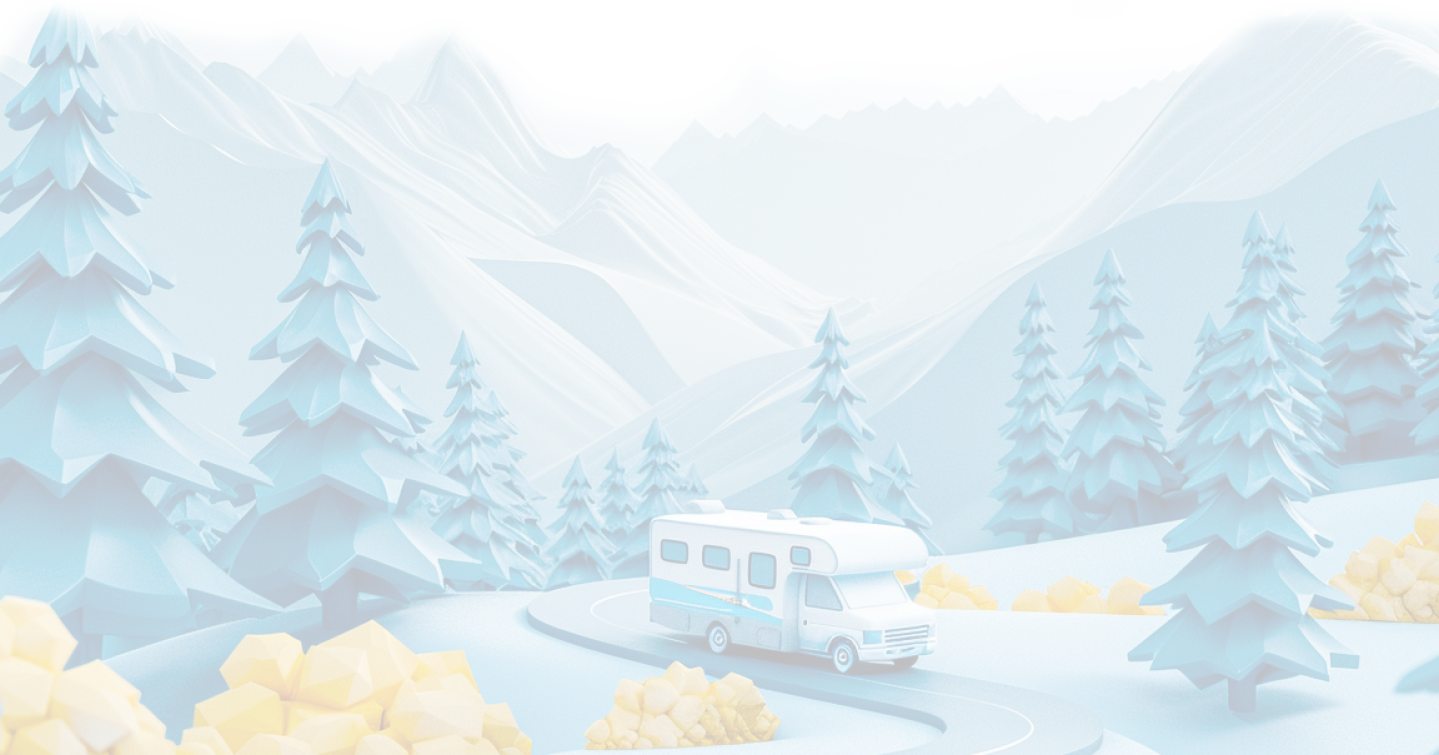
Exclusive Access To Autopilot
Let us do the planning for you! Enter in a few key details and we’ll craft a custom tailored trip just for you.
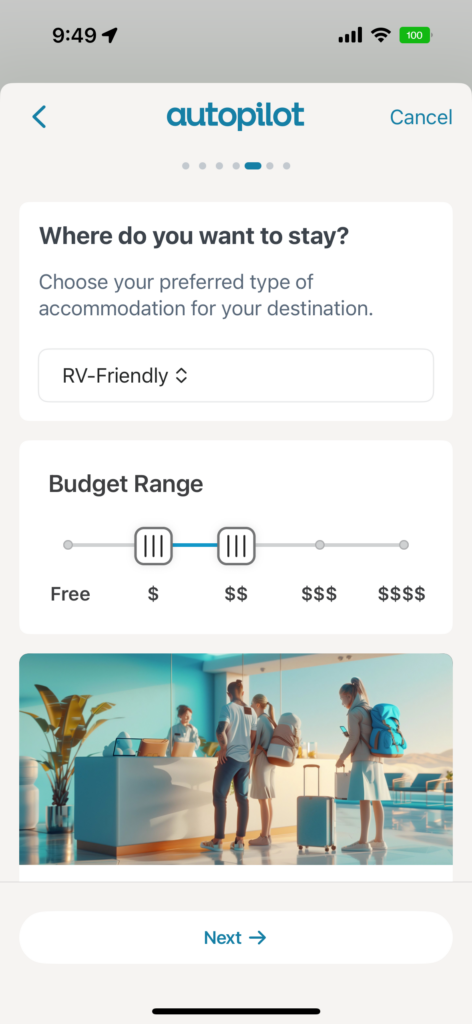
Your All-In-One RV App

Get There Safely
Get turn-by-turn navigation customized for your RV. Hit the road with confidence.
Find over 16,000 free places to park your RV on your way to your destination.
Find the Best Spots
With more than 50,000 campgrounds, Roadtrippers is the go-to resource for millions of RVer just like you.

Choose the right plan for you—and try it free for 7 days
Premium planning.

RV-Friendly Tools

Overnight RV Parking

Start free for 7 days
Then $35.99 (that's only $2.99/month), then $49.99 (that's only $4.17/month), then $59.99 (that's only $4.99/month).
† RV-Friendly routing features (including routing warnings for vehicle hazards and propane restrictions) are available in the U.S. only.
Sign Up for a Free Trial
Test drive the best features of Roadtrippers Premium for free! Eligible users will get exclusive access to all the tools needed to plan the perfect road trip.
Create a Roadtrippers account to start your 7-day free trial.
Already have a Roadtrippers account?
We need your email address
Before we can sign you up for Roadtrippers, we need your email address. Click the button below to go to your profile.
Plan your next adventure with Roadtrippers
Due after 7-day free trial
Thank you for signing up for a Roadtrippers Subscription
Get started planning your next trip now!

Good news...you already have Roadtrippers!
Thanks for being one of our most dedicated users.
- Sign up Log in Sign out
- Log in Sign out
Plan your journey, find amazing places, and take fascinating detours with our app.
If you used to sign in with Roadpass, you should now use the same username and password to log in directly with Roadtrippers above.
We couldn't find an existing Roadtrippers account using that service. Please try signing in with another option.
We need your email address to send you trip itineraries and other updates.
How do you want to plan your trip?
With just a few questions, our newest Premium feature, Autopilot, will plan your next adventure.

Traveling by RV? Here's What to Know Before You Hit the Road
Traverse america in the noble land yacht..

Among the once-dorky things we reassessed last year, RVs were second only to sweatpants. Long the domain of retired Boomers, the humble recreational vehicle became a mobile savior in pandemic times. In the summer of 2020, a whopping 46 million Americans were estimated to have hit the road, according to Ipsos . Suddenly land yachts were embraced across generations and social strata.
When I took my first big road trip—a whirlwind four-monther from Toronto to San Diego in my partner’s 1987 Chevy RV—it was one of the most incredible journeys of my life. But it was also one of the most challenging. There was so much I wish I knew beforehand: how to map out a route, where to camp, and what the hell to do when we found ourselves broken down in the middle of nowhere (it will happen).
Whether you’re a weekend warrior renting an RV or leaning into full-time life on the road, here's everything you need to know before you hit the road.
Choosing the right RV
You've essentially got three options in choosing your hotel on wheels.
Camper vans — AKA Class B motorhomes —are cheaper, easy to drive, discreet, and offer an simpler way to segue into the lifestyle. Unfortunately, they aren’t typically equipped with toilets, which is especially detrimental in the absence of public restrooms. Also, it's really tough to stand up inside.
Class C motorhomes are recognizable by the cab over the driver and the boxy back. These usually have a toilet, a shower, a little kitchenette with a fridge and stove, and are commonly available as rentals.
Finally, Class A motorhomes are the bus-like behemoths with stuff like TVs, multiple beds, and lounging areas. These tend to cost more than an actual house and are expensive to rent. Driving one is like piloting a condo down the highway.
If you’re just testing out the RV lifestyle for a weekend or even a week or two, renting is the way to go. RVShare , the Airbnb of RVs, is a good place to start, while nationwide companies like Cruise America and Road Bear RV will set you up with a land yacht.
If you’re buying into the lifestyle, expect to drop an anvil of cash, especially with RVs in such high demand. If you can find a good deal on a used one, be prepared for it to be banged up. Aesthetic problems like a loose door or broken stove can be fixed, but don’t compromise with the mechanics under the hood. Check the mileage before committing, and get it inspected by somebody who knows what they’re doing.
Advertiser Content From

We let go of a lot of norms in 2020: like shaking hands, wearing pants, and (most importantly) working in an office. You’re no longer tied to a commute — so why should you be tied to one place? Enter: Landing , the startup that’s reinventing apartment living. Thanks to its network of fully furnished (and unfurnished) apartments across the country, you can have the freedom to live (and work) practically anywhere. With perks like a 24/7 online member support, fast and easy lease transfers, and waived security deposits, you’ll have more flexibility than ever before, too.

Charting your course, and embracing chaos
One night, we were racing toward a park in New Mexico , but realized we couldn't get there before the gates closed. Dejected, we turned back… but then I looked around: We were surrounded by breathtaking mesas, so we decided to wild camp for the night. It was complete and utter bliss beneath the stars.
Point is, you can't see it all. You should plan a route, sure, but leave yourself open for those spectacular spontaneous nights.
“It’s good to have a rough idea of what you want to do so you can prepare, and you also don't want to miss anything that could be really special,” said my RV guru (and partner) Stephanie Foden , “but at the same time, you want to leave room in your plan for the random river that you come across and end up camping out for two nights because you're just so captivated by it. That’s what really makes it special: the unknown and spontaneity of it.”
Google Maps is an obvious way to plan your trip, but it doesn’t allow for more than 10 points for some reason. We use a site called Roadtrippers ($29.99/year), which allows you to plan your route and highlights cool stuff to see along the way, including roadside attractions. And, of course, to change your plans on a whim.
Finding good—and inclusive—RV parks
With all the people hitting the road, the likelihood of just rolling up to a panoramic site in a place like Yellowstone is increasingly slim. You might have better luck with an RV park… especially if you have kids in tow.
Keith and Tia Sims spend 100 days a year traveling and homeschooling their three elementary-aged kids, chronicling their adventures as Soulful RV Family . With children in tow, the family requires the key amenities that campgrounds offer, including showers, coin laundry, and sewers for pumping out shower and toilet tanks.
When they first started living in their motorhome six years ago, the Sims didn’t see other people of color at campgrounds and felt unwelcome.
“I know with racial profiling in this country when white people see Blacks pulling into a campground, they have already formed opinions and bias on who we might be and why we are there,” said Keith, who happens to be a former offensive lineman for the Miami Dolphins and Washington Redskins.
"It’s definitely gotten better,” he added. “Now, 99% of the people I’ve met and spoken with have been great.”
Still, the family doesn’t take any chances. “My family’s safety is number one!” he said. “We aren’t stopping in the middle of nowhere at Billy Bob RV Park.”
The Sims love highly-rated campgrounds like Kampgrounds of America (KOA) or Jellystones that have pools, good playgrounds, and other family-friendly features like mini-golf. “Some of the resorts, which are awesome, aren’t as kid-friendly,” Keith added.
They recommend RV Trip Wizard ($39/year) for finding a good campground and trip mapping. Another popular tool is AllStays , a $10 iOS app that lists sights, campgrounds, and other helpful stuff for your RV such as where to pump out or fill your propane tank.

Scoring a free place to camp
One night on our trip, we fell asleep to the swooshes of the Pacific Ocean on the California coast. Another, we parked in the driveway of a friendly tomato farmer close to the Las Vegas Strip. The grand total price of these stays? A big fat $0.
Before I started in the RV, I thought we’d be hopping from campground to campground, but I quickly realized that we’d drain our bank accounts. So we ended up doing a lot of wild camping, or what’s known in the RV world as boondocking. Turns out, you can always stay on Bureau of Land Management (BLM) land. If you're in a pinch, you can also stay in many WalMart parking lots.
Free Campsites maps out spots recommended by other travelers. iOverlander , meanwhile, is a free app that lists boondocking spots in addition to other key amenities.
Then there’s Boondockers Welcome ($50/year), which is like CouchSurfing for RVers. It links you up with hosts who are happy to let you park on their property overnight. We ended up staying in somebody’s driveway using this platform and it was a great way to meet a local—they even let us use their shower.
Preparing for the inevitable breakdown
This is where renting gets an advantage: if anything goes awry, you just call up the agency and they'll get you the help you need. And if you've got a membership with a roadside-assistance program like AAA or Good Samaritan, you can call in the cavalry.
If you're driving without a safety net, you're on your own. Just ask Jessy Muller, who has been on the road since October 2017 and, judging by her Instagram, A Girl and Her Commander , spends a lot of time fixing her 24-foot 1978 Dodge Commander.
Muller can’t afford to take her RV to mechanics all the time, so she fixes it with her own two hands. She recommends keeping a basic toolkit—including screwdrivers, pliers, and a multimeter to test electricity—on hand. Between a solid toolbox and some Google prowess, she's been able to keep herself moving.
“I learned how to fix my rig by diving in and getting dirty,” said Muller, author of Vanlife: Your Guide to Becoming a Modern Nomad. “I think all it really takes is curiosity, a willingness to learn, some tools, and a lot of patience!”
OK, let’s talk about poop and hygiene
Having a toilet on wheels means you get to experience the joys of pumping grey water (shower waste) and black water (toilet waste) into the sewer. Your motorhome should come with the necessary tools, but before you hit the road make sure your hose doesn’t have any holes in it (I learned this the hard way). And do not, under any circumstances, go full Cousin Eddie and pump into a storm drain: here's a handy guide to where to get rid of waste.
As for showering, folks with camper vans are advised to pack baby wipes or a camping shower that can be set up when you stop. If you want a quality shower, campgrounds are your best bet, but some truck stops like Love’s and Pilot Flying J’s have coin showers. Laundry can usually be done wherever showers are found, but I’ve found plain old laundromats are great every so often—you can easily give your rig a wash with a bucket and use their Wi-Fi while you're there.
Sign up here for our daily Thrillist email, get Next Flight Out for more travel coverage, and subscribe here for our YouTube channel to get your fix of the best in food/drink/fun.

How One Couple Uses An RV To See The World Full-Time
This post contains affiliate links to trusted partners. If you purchase through these links, I earn a commission at no extra cost to you. Thank you!
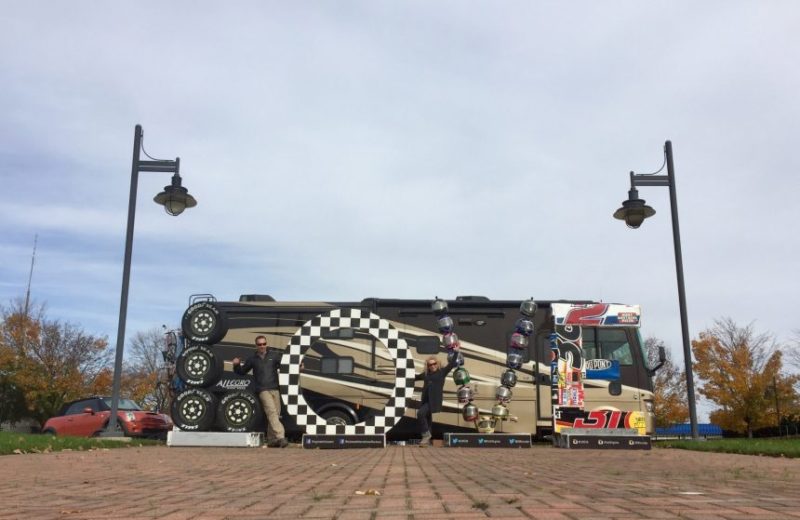
By Michele Herrmann, Jessie on a Journey Contributor
Could you imagine downsizing your life, packing up your belongings and traveling full-time by RV?
That’s exactly what Marc and Julie Bennett did, documenting their journey on their blog RVLove , as well as their entertaining and informative YouTube channel . Since 2014 the Bennetts have traveled to all of the lower 48 states plus Hawaii — with Alaska on the horizon — driven over 50,000 miles and visited more than half of the 59 national parks.
And it’s not only US travel by RV, either. They’ve walked across the border into Mexico and explored Australia. Next up: Europe in 2017.
Jessie on a Journey spoke with the couple about RVing, particularly how they ensure a safe and smooth ride. Read on to get inspired. Note: Answers are jointly shared by Marc and Julie.
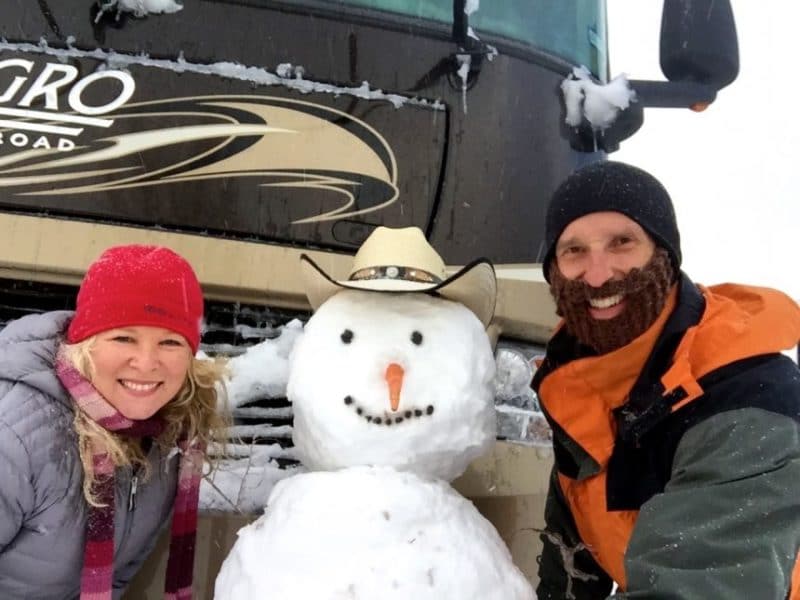
Table of Contents
1. What made you choose to RV as a lifestyle?
Each year, we make a point of sitting down and taking the time to focus on what we want to create for our lives in the years ahead. Then we start putting steps in place to make our dreams and goals happen.
When discussing what was most important to us, it became very clear that travel was dominating the conversation. We both had a deep desire to travel more, but we had our eight-year-old labradoodle, Coda, to consider — we don’t have kids, so she was our baby. While overseas travel appealed to us, we knew it wasn’t practical with a dog, so we decided to focus on U.S. travel instead.
In October 2013, we started talking seriously about buying and moving into an RV, traveling the country while we worked.
2. While traveling by RV is known in the USA, do you find it overseas as well?
The RVing community is huge in the USA; probably much bigger than most folks would ever imagine. It was certainly an eye-opener for us. We have excellent roads here and so many incredible places to see with national parks and state parks galore. There are also thousands of campgrounds and many remote dry camping locations where you can park your RV and stay for free.
While we haven’t done RVing in New Zealand , Australia, or Europe yet, RVing — caravanning/camping as it’s called down under — is also popular, though not on the scale as it is here in the States.
Roads are much narrower in Australia, New Zealand, and Europe too — which limits the size and options for RVs. We are very lucky here for sure, as the American RVing community is very well catered to in terms of RVs, roads, and campgrounds.
We do eventually plan to expand our RV life internationally and look forward to sharing more about that experience when we do.
3. How did you choose an RV?
We remembered having an inspiring encounter with a Floridian full-time RV couple in the summer of 2011. From there, the idea of living in an RV quickly transpired into an ideal solution for us to combine work, travel and quality time together.
We chose a used 2012 Class A motorhome — like a bus. It’s 36 feet long and has four slide outs, which makes it pretty roomy inside when we are parked. Almost three years later, our choice of RV continues to be ideal for our needs.
Tip from the editor: When choosing your RV, also consider what you’ll put into it and create a list of RV must haves .
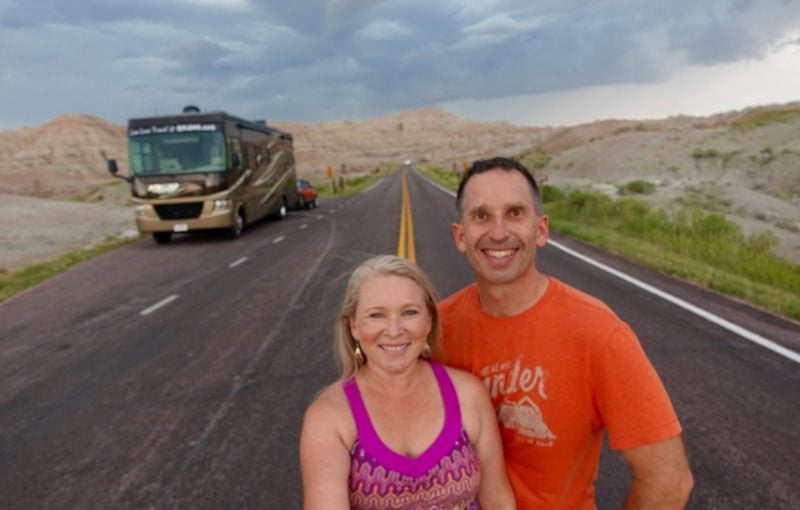
4. How does traveling by and living in an RV shape your travels?
Because RVs aren’t insulated at the same level as a stick and brick house, our travels are almost always determined by the weather. Like most RVers, we head north in the summer and south in the winter. We also like visiting places at their optimal time of year weather-wise, and prefer to visit popular places during off-season when crowds are fewer and campground fees are often lower. The beauty is we have wheels, so we can go where we like, whenever we like!
Part of all life – not just traveling by RV life – is about finding ways to deal with challenges and obstacles. As an RVer you have to learn pretty quickly to be flexible and go with the flow. Stuff is going to happen so you may as well embrace it as part of the adventure.
Instead on focusing on the problem, we try to find a solution. Having a positive, optimistic, troubleshooting attitude is a great advantage. When you live in a small space like in an RV with a partner, you’re only going to succeed by being a team. You really have to pull together to work through challenges.
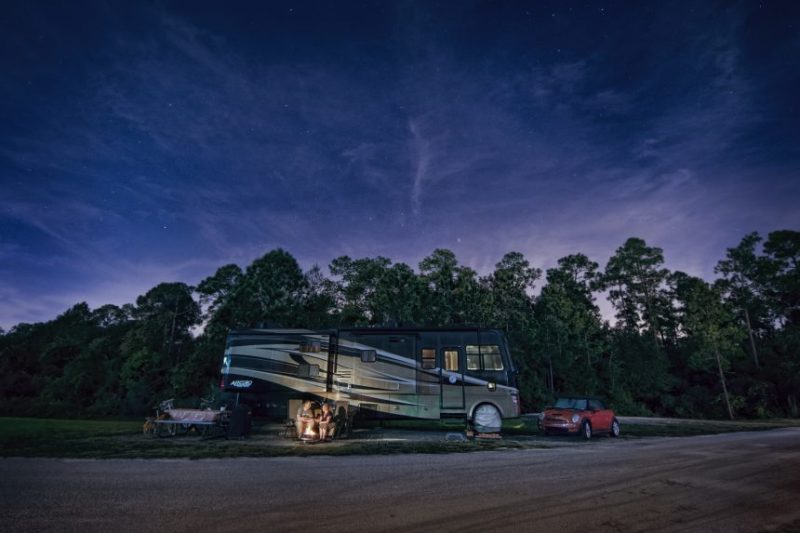
5. Do you ever feel the need to stay put in a certain area?
We try to stay in one location for two-to-three weeks at a time. This way we can properly explore the area while also having downtime for ourselves.
That being said, sometimes we move at a faster pace and stay only a few days or a week. While this can be fun and you see a lot, it also gets pretty tiring, especially as we’re still working full-time. In 2016, we only had a couple of three-week stints in one location, and we loved being able to stay still for a while and catch our breath.
During winter, we will stay in an area for longer periods. For example, we spent last winter in Florida, and this winter we’re in the desert southwest — mainly Arizona and southern California; but, we do move from place to place every couple of weeks in the general area.
6. Do you ever take breaks from traveling by RV?
In 2016, we had taken a few breaks from the road. In March, we flew to Australia for a month. We also took a “forced break” when our RV went in for repair for five days. During this time we flew to Colorado to visit family over Thanksgiving.
In December we flew to Maui, Hawaii — our 49th state visited — for nine days for an actual vacation. We stayed in hotels and rented a car to explore the island. It was great to really get away and have a very different experience. But by its end, we were also glad to get back to our RV life, our own beds and comforts of home. We love that we can truly have the best of both worlds whenever we choose.

7. What misconceptions do you find the public has about traveling by RV?
I think many people don’t realize just how homey, modern and spacious many RVs really are! I’m sure many people imagine we are roughing it – crammed into a box on wheels – when we actually have a really lovely, livable home. Most people are surprised when they walk inside our RV. The first comment is usually “Oh, it’s so spacious!” They soon realize how livable it really is.
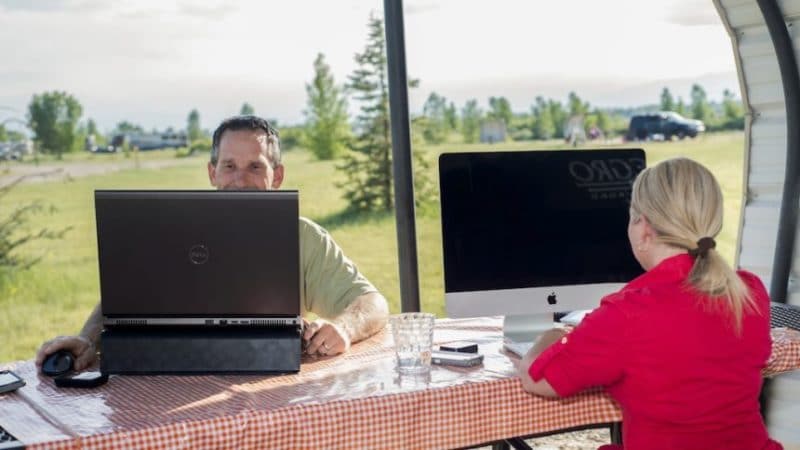
8. How are you able to maintain an income while traveling by RV?
Marc is unusual in that he has a full-time, 40-hour-per-week job for a company based out of Texas. More than half of their employees work remotely, so it was an easy transition for Marc, who gets a regular salary, benefits, and paid vacation time.
Julie is self-employed so her schedule is more flexible. She produces all of the written, photographic and video content for our RVLove website and YouTube channel. Additionally she’s working on a book and does lifestyle coaching for a handful of clients.
All of this combined brings us a few smaller streams of income, which we hope to see grow over the coming years.
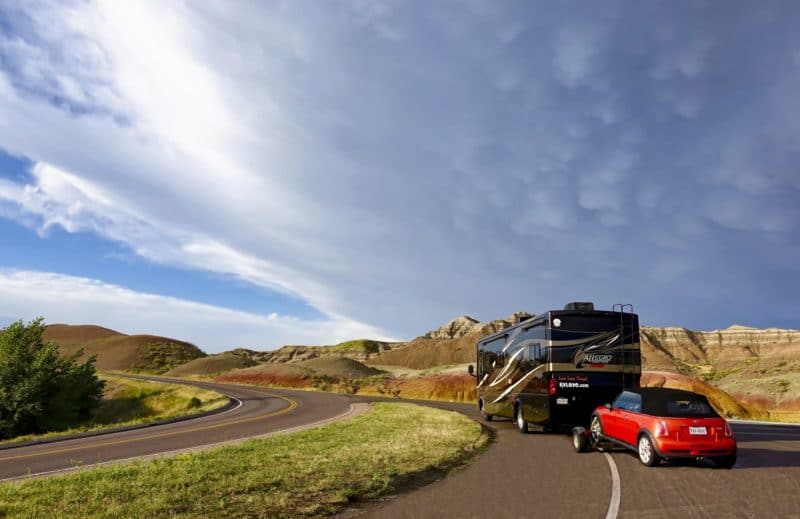
9. How do you handle issues that come up when traveling by RV?
With a combination of flexibility, patience and planning! Some things we can plan for – like grocery shopping, laundry and refueling the RV. It’s easy enough to find local supermarkets and supplies, plus we use Amazon a lot. Their two-day Amazon Prime service is a must for RVers, and we can receive deliveries at most campgrounds. We do laundry every couple of weeks in the campground laundry and can usually do three-four loads at a time, which is really efficient. We aim to fill our RV mostly at truck stops which are better equipped to handle larger, taller vehicles. You definitely have to think and plan ahead, that’s for sure!
We’ve never had an issue with safety or felt at risk, but we are mindful and use common sense. Plus Marc is a former police officer, so he’s got a real sense for any potentially unsafe or dubious situations. Breakdowns are something we can’t usually plan for, but that’s where we just need to get resourceful and stay focused on problem-solving. We have roadside assistance as well, which is a must. The few times we’ve needed to leave the coach in a shop for repair for more than a day, we will usually stay in a hotel or with friends/family if there are any nearby.
10. What’s your best piece of advice for someone wanting to get into RVing?
Take the time to do your homework and research at least six months — though ideally a year — in advance. There is so much to consider, learn and do in preparation of traveling by RV. There’s no rush and if you plan properly and “get it right” early on, you can save yourself a lot of headaches and money. Start online, read plenty of blogs and watch YouTube videos to see what does (and doesn’t) work from other RVers out there doing it.
There are countless ways to thrive in the RV lifestyle; but you’ll get off to a stronger start with more confidence if you have a plan. You’ll want to have budgeted and mapped out the key elements in advance. That frees up time, energy and money so you can kick back and really enjoy the journey and, of course, start heading to those amazing destinations!
Have you ever tried traveling by RV?
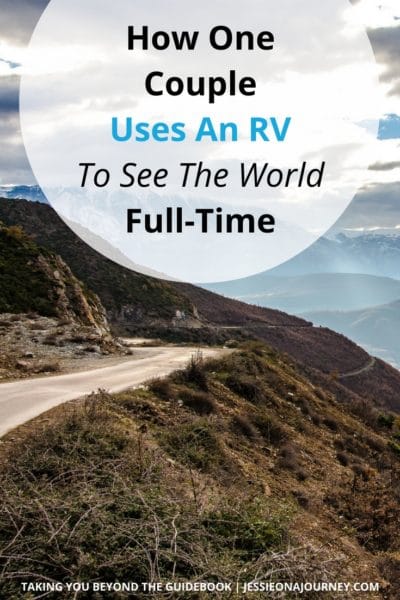
Related posts:
About mherrmann
Michele Herrmann is a travel and lifestyle writer and editor who is based in New York. She contributes destination features and articles on travel trends and culinary finds to Fodor’s, Frommers, Budget Travel, Zagat Stories, Forbes, Smithsonian Magazine, and more. Additionally, Michelle provides editorial and marketing content to national and international media outlets and B2B and B2C companies. She previously led Twitter chats for Fareportal's OneTravel and CheapOAir, wrote blog posts for HomeExchange.com, managed article submissions for Pink Pangea, and contributed articles to amNewYork, Yahoo Travel, Time Out New York, TravelPulse, Travelzoo, RoamRight, and ShermansTravel.

Hi, I’m Jessie on a journey!
I'm a conscious solo traveler on a mission to take you beyond the guidebook to inspire you to live your best life through travel. Come join me!
Want to live your best life through travel?
Subscribe for FREE access to my library of fun blogging worksheets and learn how to get paid to travel more!

Turn Your Travel Blog Into A Profitable Business
Subscribe to my email list to snag instant access to my library of workbooks, checklists, tutorials and other resources to help you earn more money -- and have more fun -- blogging. Oh, and it's totally FREE! :) // Privacy Policy .
Check your inbox for your welcome email + resource library password!
This is so exciting and inspiring! My wife and I are in the middle of planning this lifestyle now. We’re using a travel trailer and we’ll be traveling with our 6 month old and two dogs. A lot of people think we’re crazy, though most are excited for us. Thanks for the inspiration RVLove!
Sounds amazing! Good luck 🙂
Thanks for the great article!
Leave a Comment Cancel Reply

EXCLUSIVE: America’s Largest RV Show to Display a Range of Travel Trailers

In Hershey, Pennsylvania, nearly 1,500 RVs will display at the Pennsylvania Recreation Vehicles and Camping Association’s (PRVCA) annual America’s Largest RV Show at Giant Center from Wednesday through Sunday.
Nearly 50,000 consumers and approximately 40 manufacturers are expected at the event. Last year, the show totaled 45,535 attendees.
PRVCA Executive Director Heather Leach said, “We are hoping the show kind of gives everybody a little boost for the winter season coming up.”
Among various new models set up at the venue, manufacturers revealed new travel trailers available at the show.
The A-frame manufacturer implemented various 2025 model-year updates across its vehicles. The new RVs feature Mirage gray blackout curtains, Seefeld gray interior paneling and Shalestone countertops. The interior includes upgraded European-style cabinets, cabinet hardware and new lighting.

Balancing beads inserted into the trailer tires are another new feature added to the entire model lineup. The balancing beads are glass spheres made from tempered glass. Aliner Director of Sales Allan Reeping said, “Our balancing beads are an effective way to balance the vehicle wheel assembly for the lifetime of the tire.” Reeping said the beads reduce vibration while towing, extending the tires’ life and reducing trailer road stress.
“Our 2025 updates are designed to elevate both functionality and style,” Reeping said. “We are committed to providing our customers with a premium RV experience that combines innovation with comfort.”
Aliner will display 12 models at the Hershey Show, hosted by Beckley’s RV in booth A7 on the show map in the Acadia Street section.
- Classic Twin Bunk: The newest model to carry the Classic name has a 15-foot length and weighs under 2,000 pounds. The trailer includes two twin beds, a two-person dinette and a galley with a European-style flush sink and stove. The Classic Twin Bed is standard with a 3.2-cubic-foot, 12-volt compressor refrigerator, a 9,000 BTU heat pump, a 6-gallon water heater, a microwave and a furnace.

- 40th Anniversary Edition: To celebrate the manufacturer’s 40th anniversary, Aliner introduced its limited edition green 40th Anniversary Evolution 12 at last year’s Elkhart Extravaganza. To close out Aliner’s year-long 40th-anniversary celebration, Beckley’s RV in Thurmont, Maryland, will feature a 40th-anniversary Ranger 12 edition at the Hershey Show. Reeping said the remaining anniversary Ranger trailers will be at the Hershey Show.
Grand Design
Transcend One
Grand Design will bring two single-axle, stick-and-tin towable floorplans. Both models are 8 feet wide and built on Bal RV Product’s Norco frame. The towables include a queen-sized bed, a heated/enclosed underbelly and a 13,500 BTU air conditioner. The trailers are prepped for 600 watts of solar power, a 2,000-watt inverter and a 30-amp solar controller. The vehicle includes passthrough storage.

- 151BH : The 19.5-foot-long bunk house model has a 3,600-pound dry weight. The travel trailer includes a dry bath, bunk beds and a jack knife sofa with a pet dish drawer underneath.
- 151RB : The couple’s coach with a rear bath is also 19.5 feet long. The towable includes a rear dry bath, a booth dinette and a Murphy bed. The model includes a pet dish drawer and a pull-out trash can.

- 322FKTS : The model is Reflection’s first front kitchen floorplan. The RV includes a drop-frame chassis, similar to Imagine trailers, to create a front windshield. The couple’s coach is under 35 feet long and weighs nearly 10,000 pounds. The expanded dry bath includes washer/dryer prep. The model also includes new accent colors. The Collins décor package features warm brown tones. Pendant and sconce lights populate the RV.
Jayco will bring various new models to attract consumers at Hershey. Jayco Director of Product Development for Jayco Lightweight Brands John Fisher said the manufacturer received positive feedback at its Dealer Homecoming in July.
Fisher said, “Many dealers said this towable lineup that we came out with for model year 2025 is the strongest lineup they have ever seen from Jayco.”
Jay Feather Air
This year, Jayco’s White Hawk brand merged under the Jay Feather name to create the Jay Feather Air. The 8-foot wide, single-axle travel trailers feature Azdel sidewalls. The towables include Goodyear tires with self-adjusting brakes.
Appliances include a Coleman-Mach Quiet Series air conditioner and an 11-cubic-foot, 12-volt refrigerator. The kitchen and bathroom have stainless-steel sinks. Jayco will bring two floorplans to Hershey.

- 16RB: The towable includes a rear dry bath, a jack knife sofa and a queen-sized bed. The exterior features a griddle and a 13-foot awning.
Jay Feather
- 27MK: The couples coach is 33 feet long with opposing rear slide outs. The living room is encased in oversized panoramic windows. A dry bath is next to a front queen-sized bed. An island separates the kitchen from a dinette and tri-fold sofa. The sofa sits across from an entertainment center with a fireplace. The towable includes a 10.5-foot awning and an 8-foot awning.
Heartland will debut its new Corterra travel trailers at Hershey. According to Corterra Product Manager Trent Brickner, after the manufacturer displayed the Corterra fifth wheel at last year’s show, “it was evident that we needed to release the travel trailer.”
Brickner said many consumers favored the luxury of the fifth wheels. The manufacturer offers similar features in its travel trailers.
The towables feature dimmable LED strip lights, solid-surface countertops, a solid step with XL Grab Rail and a 40-inch smart TV with a ceiling-mounted Bluetooth speaker. The travel trailers include 190 watts of solar power with a 30-amp charge controller, an on-demand hot water heater and a Tri-Flo air conditioning system.

- 2RK: The model includes a queen-sized bed and a dry bath. The RV has one slide out with a sofa, refrigerator and pantry. The towable has individual bedroom and living area entrances. The travel trailer includes a 30-gallon black water tank, a 60-gallon gray water tank and a 46-gallon freshwater tank.
- 3RL: The double slide out towable includes a dry bath and a queen-sized bed. The kitchen includes an island counter, a refrigerator and a pantry. The RV includes a 30-gallon black water tank, an 87-gallon gray water tank and a 44-gallon freshwater tank.
- 3BH: The model includes two slide outs and two entrances. A dry bath is in the middle of the cabin. The rear features opposing bunk beds. A queen-sized bed is in the front of the RV. The towable’s GVWR is 9,988 pounds.
Forest River
Cherokee Grey Wolf
- 29NM : The model’s rear parlor room has adjustable bunk beds. The front bedroom features a king-sized bed and a designated entry. A dry bath separates the bedroom from the living area. The kitchen includes an air fryer, a refrigerator and a pantry. The exterior includes an outside kitchen and an outside TV mount. The GVWR is 7.905 pounds.
Cherokee Timberwolf

No Boundaries
- RVS3: The model is a travel trailer and a destination trailer crossover. A king-sized bed with a super storage center is in a rear slide out. The bedroom includes a dresser with a fireplace and a rear patio. The front of the RV includes a bathroom suite with dual sinks. A loft above the bathroom includes two bunk beds. The entrances are sliding doors. The model’s GVWR is 10,490 pounds.
KZ will bring 16 travel trailers to Hershey. The manufacturer will bring five Connect floorplans. Most of the lightweight laminated towables will feature bed slide outs.
Three Connect Minis will be at the show. The towables are single-axle lightweight laminated trailers.

KZ will have two Classic floorplans. The models are single-axle and stick-and-tin.
The manufacturer will bring six Sportsmen floorplans. The stick-and-tin models include various standard features such as TVs with fireplaces.

- Daily business news on the RV industry and the companies and people that encompass it
- Monthly printed and/or digital magazine filled with in-depth articles to increase profit margins
- Statistics, data and other RV business trade information

DRN Media dba RV News 685 S Arthur Ave., Ste 6 Louisville, CO 80027 (720) 353-4003 (Hit ext. 1 for the Operator)
RV News magazine 720-353-4003 [email protected]
Copyright 2019 DRN Media Inc. All rights reserved.
Website by Effect
- The Best Things To See...
The Best Things to Do in Rostov-on-Don

Contributor / Journalist
The city of Rostov-on-Don lies all along the banks of the Don river. It is a beautiful place to wander around; there are many green spaces, and during the summertime, you can bask in the sun or go on a relaxing boat ride down the river, a glass of wine in hand. Here are some of the top things to do in Rostov-on-Don.
Take a quick walk along pushkin street.
Pushkin Street is the main promenade in the downtown city area. The street, named after Alexander Pushkin, is full of cafés, bars , restaurants and historical statues, along with beautiful flowers and trees; it’s an ideal place to spend a relaxing weekend. Don State Public Library, located in a unique modern building and one of the biggest libraries outside of Moscow, also sits on Pushkin Street.
Pushkin Street, Rostov-on-Don, Russia
https://www.instagram.com/p/BURpENmBbT0/
Explore the embankment
Take a walk on the embankment by the slow-flowing Don river. Street performers entertain and provide activities for the public during the summer months, and many people opt to take a boat ride on the water. You can even get on a disco boat here and dance the night away.
The embankment, Rostov-on-Don, Russia
https://www.instagram.com/p/BXxjqKQBWYo/?taken-by=rostov_nadonu

Become a Culture Tripper!
Sign up to our newsletter to save up to $1,200 on our unique trips..
See privacy policy .
Try local food at Rostov’s Central Market
This place has everything that a Russian regional market should have; meat and fish, sweets, ice cream, excellent salads, and a few delicacies from Korea and Georgia. You won’t find many souvenirs for tourists here, but it is still worth wandering the stalls.
https://www.instagram.com/p/BNCnw_DA4Lo/?tagged=%D1%80%D0%BE%D1%81%D1%82%D0%BE%D0%B2%D1%80%D1%8B%D0%BD%D0%BE%D0%BA
Visit the local parks and gardens
There are numerous beautiful parks located around the city. You can discover some of the main green spaces simply by walking along Pushkin Street, and there are more in the centre near Bolshaya Sadovaya Street.
https://www.instagram.com/p/BXp8BIKht-_/?taken-by=rostov_nadonu
Take a look at Bogoroditsa Cathedral
Go on a day trip to azov.
Once you’ve checked out all the main historical places in Rostov-on-Don, and you have some time to spare, you should make sure to stop by the nearby town of Azov. Steeped in history, the town once served as a Turkish outpost, and today is home to the remains of Azov Castle.
Looking for things to do in Sochi? Check out our city guide here .

The Best Restaurants in Rostov-on-Don

The Best Halal Restaurants in Rostov-On-Don

The Best Bars in Rostov-On-Don

The Best Places to Stay in Rostov-On-Don

The Best Pan-Asian Restaurants in Rostov-on-Don

The Top Attractions in Rostov-on-Don

Meet Maxim Ilinov, The Rapping Cossack from Rostov-on-Don

Interesting Rostov-on-Don Facts You Should Know

The Best Hidden Bars of Rostov-on-Don

The Best Places for Burgers in Rostov-On-Don

Best Bars in Rostov-on-Don to Watch the 2018 World Cup
Culture Trip Summer Sale
Save up to $1,200 on our unique small-group trips! Limited spots.

- Post ID: 1487814
- Sponsored? No
- View Payload

IMAGES
VIDEO
COMMENTS
Have a well-stocked first-aid kit with kid-friendly medications, such as pain relievers and antihistamines, to address any minor health issues that may arise. 36. Prioritize Safety: Safe & Sound. While safety is always important when RV traveling, when there are kids on board it becomes even more important.
Another travel tip many seasoned RVers employ is to take breaks often during your drive time. Just a 10-minute break to stretch your legs, go to the restroom, and get a snack, will make the drive time more relaxing. Additionally, I would advise you to eat a light lunch. Don't skip it.
How to Live and Travel Full-Time by RV
The Complete Guide to Traveling the US by RV
Mike Wendland is a multiple Emmy-award-winning Journalist, Podcaster, YouTuber, and Blogger, who has traveled with his wife, Jennifer, all over North America in an RV, sharing adventures and reviewing RV, Camping, Outdoor, Travel and Tech Gear for the past 12 years. They are leading industry experts in RV living and have written 18 travel books.
Leveling your RV before filling your tank will ensure that you are really getting a full tank. 4. Mount towel bars (and other things) on your walls with exterior grade Gorilla mounting tape. adheres to RV walls much better than Command strips or anything else we've found. 5.
Planning an RV Trip: The Complete Guide
How to plan an RV road trip in six steps
In an RV, you need to check the tire pressure more frequently than in lighter vehicles, Marc said. Check your RV's tire pressure often. Tetra Images/Getty Images. RV tires are put under heavier ...
Rv travel is a lot of fun. That said, there's a lot to know when traveling with a trailer or motorhome, something that can make the whole experience a little overwhelming, especially for first-timers. Fortunately, there are ways to make things a little easier on yourself. The first step is to educate yourself as much as possible before ...
RV Trip Planner - AI-powered trip planning for RVers
North/Outside Boston, MA (Tent Trailer) $450 with insurance and 100 miles a day. West/San Bernadino, CA (Motorhome) $1,600 all-in with insurance and 100 miles a day. National rental agency ...
RVtravel ... RVtravel
How to Pack for Fall Travel; RV Camping Checklist. Packing your RV camping essentials is, well, essential… but as any RVer who's ever driven away only to realize their RV antenna or front door step was still extended knows, it's equally important to double-check your rig from top to bottom every time you get behind the wheel.
RVtravel
They recommend RV Trip Wizard ($39/year) for finding a good campground and trip mapping. Another popular tool is AllStays, a $10 iOS app that lists sights, campgrounds, and other helpful stuff for ...
An RV trip planner offers the easiest way to plan an unforgettable road trip. We'll walk you through five of the best available. Let's go! ... Our Top 5 RV Trip Planner Apps for Easy RV Travel. Following are some great RV trip planners that offer most or all of our must-have features… and that we use ourselves for planning our RV trips. ...
Join Keep Your Daydream for an epic RV adventure across the USA. Learn tips, tricks and destinations from their amazing videos.
Having a positive, optimistic, troubleshooting attitude is a great advantage. When you live in a small space like in an RV with a partner, you're only going to succeed by being a team. You really have to pull together to work through challenges. During the winter months, the Bennetts often head south. 5.
Official RV 101 ® Guide To RV Water Heater Use & Care Official RV 101 ® Guide - Trailer Towing, Weights & Safe Towing Explained Official RV 101 ® Guide to Understanding Trailer Sway. RV Online E-Book Value Sets A Collection of RV Education 101 E-Books - 9 RV E-BOOK BUNDLE SET Official RV 101 ® Guides for Travel Trailer Bundled Set
The travel trailers include 190 watts of solar power with a 30-amp charge controller, an on-demand hot water heater and a Tri-Flo air conditioning system. The 2025 Corterra travel trailer. 2RK: The model includes a queen-sized bed and a dry bath. The RV has one slide out with a sofa, refrigerator and pantry.
Over 50,000 articles reviewed and published by our experienced team. Over 50 years of combined experience researching, writing and reviewing travel articles. Over 40,000 hours spent on research and fact-checking from credible sources (last year's data). Optimizing content from data-driven insights collected directly from users on our platform ...
Top Rostov-on-Don Air Tours: See reviews and photos of Air Tours in Rostov-on-Don, Russia on Tripadvisor.
Pushkin Street is the main promenade in the downtown city area. The street, named after Alexander Pushkin, is full of cafés, bars, restaurants and historical statues, along with beautiful flowers and trees; it's an ideal place to spend a relaxing weekend. Don State Public Library, located in a unique modern building and one of the biggest libraries outside of Moscow, also sits on Pushkin ...
Top Rostov-on-Don City Tours: See reviews and photos of City Tours in Rostov-on-Don, Russia on Tripadvisor.